

Schengen Visa Bank Balance
Navigating the Schengen Visa Bank Balance: Minimum Requirements Explained
When your dreams of exploring the enchanting landscapes, vibrant cultures, and historic cities of Europe come knocking, a Schengen visa stands as your key to the continent. This essential document allows you to traverse most European countries within the Schengen Area seamlessly. Yet, as with any journey, the path to obtaining this visa comes with its challenges, one of which revolves around the financial aspect. Your ability to prove your financial sufficiency, often represented by the minimum bank balance requirement, plays a pivotal role in this process. In this comprehensive guide, we’ll delve into the intricacies of the minimum bank balance required for a Schengen visa, unravelling the factors that influence it, country-specific variations, and the essential documents needed to ensure a smooth application process.
The Significance of Minimum Bank Balance
Embarking on a journey to a foreign land necessitates more than just the excitement of exploration; it calls for careful planning, meticulous preparation, and adequate financial resources. The minimum bank balance requirement is a testament to your ability to support yourself throughout your stay in the Schengen Area. It’s the minimum amount of money stipulated by the authorities that you need to have in your bank account. This sum substantiates your capability to cover your expenses, accommodation, and daily needs, ensuring that your visit remains smooth, comfortable, and hassle-free.
The Documents
When applying for a Schengen visa, you will need to provide several essential documents. Here is a comprehensive list of the required documents for a Schengen visa application:
- Visa application form: Fully completed and signed.
- Passport: Valid for at least three months beyond your planned departure from the Schengen area.
- Two recent passport photos: Taken within the last three months.
- Round trip reservation or itinerary: Including dates and flight numbers.
- Travel insurance policy: Covering at least €30,000 for medical emergencies.
- Proof of accommodation: Such as hotel reservations, rental agreements, or a letter of invitation.
- Proof of financial means: Bank account statements showing sufficient funds for your stay.
Additional documents may be required depending on your specific circumstances:
- Sponsorship letter: If someone else will financially support your trip.
- Proof of employment: Including a letter from your employer stating monthly wages and duration of vacation.
- Proof of relationship: If visiting family or friends, provide a letter of invitation and proof of relationship.
It is crucial to ensure that all documents are in line with the visa documentation guidelines, including having original copies with translations if necessary. The specific requirements may vary by country, so it’s advisable to consult the relevant consular authority for precise details.
Country-Specific Minimum Bank Balance Requirements
Each country within the Schengen Area adheres to its unique minimum bank balance requirements, reflecting the intricacies of their cost structures and economic environments. Let’s explore the varying requirements of some Schengen countries:
Austria’s minimum bank balance requirement is not fixed and is determined on a case-by-case basis. However, maintaining a budget of approximately €100 per day is advisable, considering the average expenses of tourists.
For those visiting Belgium, the required minimum bank balance stands at €45 per day when staying with family or friends, and €95 per day when residing in a hotel.
Croatia’s minimum financial requirement is €70 per day, which can be reduced to €30 per day with the presentation of specific documents, such as a certified letter of guarantee or a tourist booking.
Czech Republic
Short-term visa applicants for the Czech Republic require a financial means of 2,980 CZK or €127.40 for their stay. This amount increases for stays exceeding 30 days.
Denmark’s required minimum bank balance is approximately 500 DKK or €67.17 per day for hotel stays and 350 DKK or €47.02 per day for hostel stays.
Applicants for Estonia must exhibit financial means equivalent to €130.80 per day for the duration of their stay.
To enter Finland, €30 per day is required to demonstrate sufficient financial resources for the visit.
France’s minimum amount varies based on stay duration, ranging from €32.50 to €120 per day.
Germany requires a minimum bank balance of €45 per day for the intended stay.
Greece mandates €50 per day for standard stays and €300 per day for visits of up to five days.
Hungary’s minimum financial requirement is 10.000 HUF or €26.95 per day, with the potential for higher amounts if supported.
Iceland stipulates ISK 8,000 or €53.36 per day, reduced to ISK 4,000 or €26.68 per day with sponsorship.
Italy’s requirements vary based on the type of visa, with amounts ranging from €26.33 to €118.79 per day.
A minimum of €14 per day is necessary for stays in Latvia.
Liechtenstein
Minimum requirements in Liechtenstein are CHF 100 or €102.48 per day for self-payers and CHF 30 or €30.72 per day for students.
Lithuania requires €40 per day and financial means to return to your home country.
Luxembourg necessitates approximately €67 per day for personal resources during the stay.
Malta mandates €48 per day for the duration of the visit.
Netherlands
The Dutch requirements are approximately €55 per person per day.
Proof of a bank balance of 500 NOK or €43.33 per day is required for Norway.
Financial means range from PLN 75 to PLN 300 depending on stay duration in Poland.
Portugal requires €75 for each entry and €40 per day spent.
Financial means of €56 per person per day are needed for Slovakia.
Slovenia stipulates €70 per day for personal expenses.
Spain’s requirements are a minimum of €100 per day with a minimum of €900 per person.
Sweden demands SEK 450 or €40.12 per day for financial resources.
Switzerland
Switzerland requires CHF 100 or €102.48 per day, reduced to CHF 30 or €30.72 for students.
Obtaining a Schengen visa is a gateway to the breathtaking beauty and diverse cultures of Europe. Amid the paperwork and preparations, the minimum bank balance requirement stands as a fundamental pillar. Ensuring you meet or exceed this requirement not only assures your financial stability during your journey but also communicates your commitment to abiding by the visa regulations. By meticulously preparing your financial documentation and understanding the country-specific nuances, you pave the way for a seamless and unforgettable Schengen experience.
Looking for assistance with immigration paperwork? Get expert help from professionals specializing in immigration services.

Subscribe to our weekly newsletter below and never miss the latest product or an exclusive offer.
Thanks, I’m not interested
Visa Traveler
Exploring the world one country at a time
Schengen Visa for Tourists: Everything You Need to Know
Updated: October 19, 2023
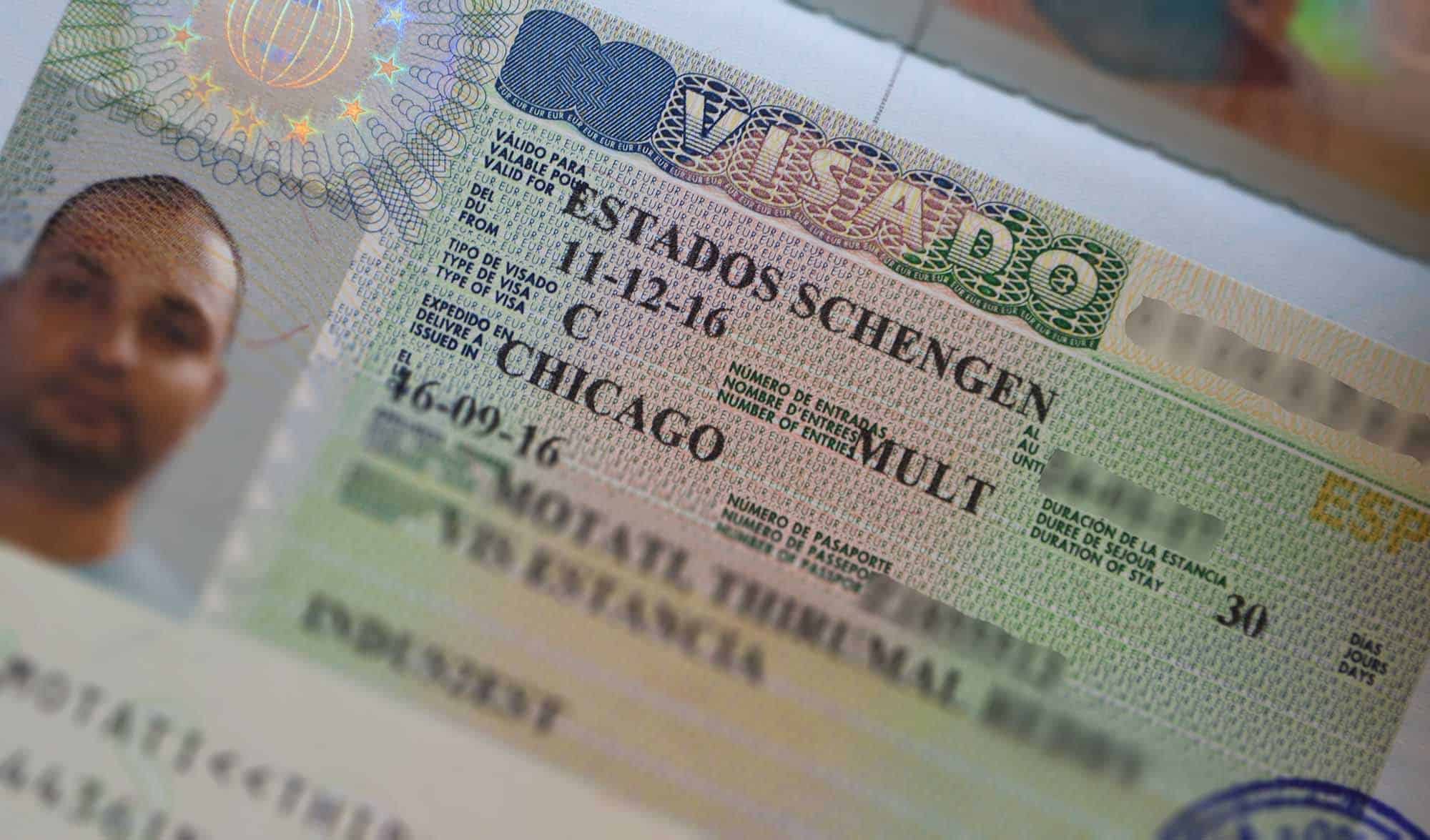
The Schengen visa is a type of visa that allows you to travel freely within the Schengen area. As per the UN, the continent of Europe is comprised of 44 countries. Of these, 27 countries are part of the Schengen agreement. The Schengen agreement abolished internal borders between these 27 countries.
A Schengen visa is a unified visa for short stays (up to 90 days) for these 27 European countries. Therefore, a Schengen visa is the only visa you will need to travel to any of these 27 countries.
Table of Contents

BONUS: FREE eBOOK
Enter your name and email to download the FREE eBOOK: The Secret to VISA-FREE Travel
Opt in to receive my monthly visa updates
You can unsubscribe anytime. For more details, review our Privacy Policy.
Your FREE eBook is on it’s way to your inbox! Check your email.
SCHENGEN VISA POLICY
The Schengen visa policy was introduced in 1995 which abolished internal borders between the Schengen countries.
Once you have obtained a Schengen visa, you can travel freely between the Schengen member countries without any border controls. For example, if you enter France and would like to go to Germany, you will not pass through passport controls at the France-Germany border.
Keep in mind that the Schengen visa policy only applies to the Schengen area and not to the entire European Union.
Schengen visa countries
There are currently 27 countries in the Schengen area that you can visit with a single Schengen visa. Below is the list of countries.
- Czech Republic
- Liechtenstein
- Netherlands
- Switzerland
Apart from the above 27 Schengen member countries, you also travel to 50 non-Schengen countries visa-free using a Schengen visa .
SCHENGEN VISA TYPES
Those intending to visit the Schengen countries for tourism must either be visa-exempt or hold a valid Schengen visa from the embassy.
- Visa EXEMPTION (ETIAS from 2024)
- Type-A (Airport Transit Visa)
- Single-entry
- Double-entry
- Multiple-entry
- Type-D (Long Stay Visa for stays more than 90 days)
- Limited Territorial Schengen Visa
For this guide, we will focus only on visas for tourism intent, that is Type-C Uniform Schengen visas.
SCHENGEN VISA REQUIREMENTS
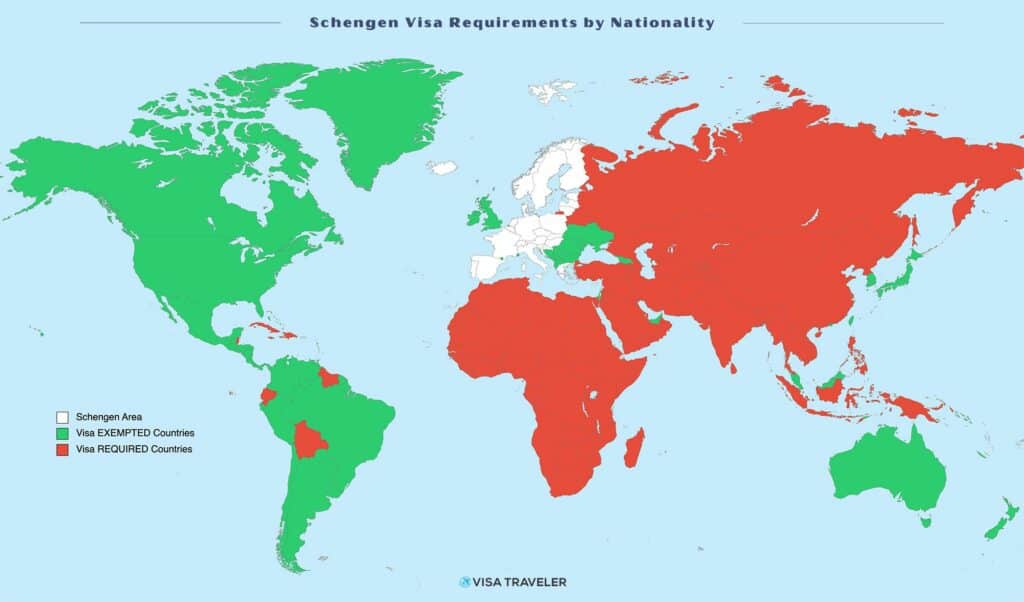
Minimum passport validity required to enter the Schengen area
Passport must be valid for at least 3 months from your planned departure from Schengen area.
Example: If your trip is from Mar 10 to Mar 20, your passport must be valid at least until Jun 20.
Visa EXEMPT nationalities
90-day entry.
- Antigua And Barbuda
- Bosnia And Herzegovina
- El Salvador
- Marshall Islands
- New Zealand
- North Macedonia
- Solomon Islands
- South Korea
- St Kitts And Nevis
- St Vincent and The Grenadines
- Timor-Leste
- Trinidad And Tobago
- United Arab Emirates
- United States of America
- United Kingdom
- Vatican City
Visa REQUIRED nationalities
- Afghanistan
- Burkina Faso
- Central African Republic
- Congo, Dem. Rep. of
- Congo, Rep. of
- Cote d’Ivoire
- Dominican Republic
- Equatorial Guinea
- Guinea-Bissau
- North Korea
- Papua New Guinea
- Philippines
- Sao Tome And Principe
- Saudi Arabia
- Sierra Leone
- South Africa
- South Sudan
- Turkmenistan
IMPORTANT Palestine and Kosovo are not recognized by at least one Schengen member state. If you are a Palestinian or Kosovo national, please inquire at your nearest Schengen consulate for visa requirements for your passport.
SCHENGEN VISA EXEMPTION (ETIAS FROM 2024)
Currently, 62 nationalities can enter the Schengen area without a visa. Though you do not require a visa, you must consider the total duration of your stay in the Schengen area and must carry the mandatory documents.
Duration of Stay in Schengen Area – the 90 days/180 days rule
Non-EU Passport holders who are visa EXEMPT are allowed to stay in the Schengen area countries for up to 90 days within a period of 180 days. This “90 days in any 180 days” applies to all short-stay visitors to the Schengen area.
- Stays in EU countries that are NOT part of the Schengen area (Bulgaria, Romania, Cyprus and Ireland) are not counted in calculating the period of stay.
- Stays in non-EU countries that are part of the Schengen area (Iceland, Liechtenstein, Norway and Switzerland) are counted in calculating the period of stay compliance with the 90-day / 180-day rule.
- Both the day of entry and the day of exit are counted in the calculation.
- The 180-day period is referenced backward from the day of checking.
- A simple rule of thumb is, if you are out of the Schengen area for a continuous period of 90 days allows you a new stay of 90 days.
You can use the Schengen calculator to determine the number of days you are allowed to stay in the Schengen area. Here is the manual on how to use the Schengen calculator.
Documents to carry
Visa EXEMPT individuals must carry the following documents when entering the Schengen member states.
- Valid passport
- Proof of onward travel
- Proof of accommodation
SCHENGEN VISA FROM THE EMBASSY
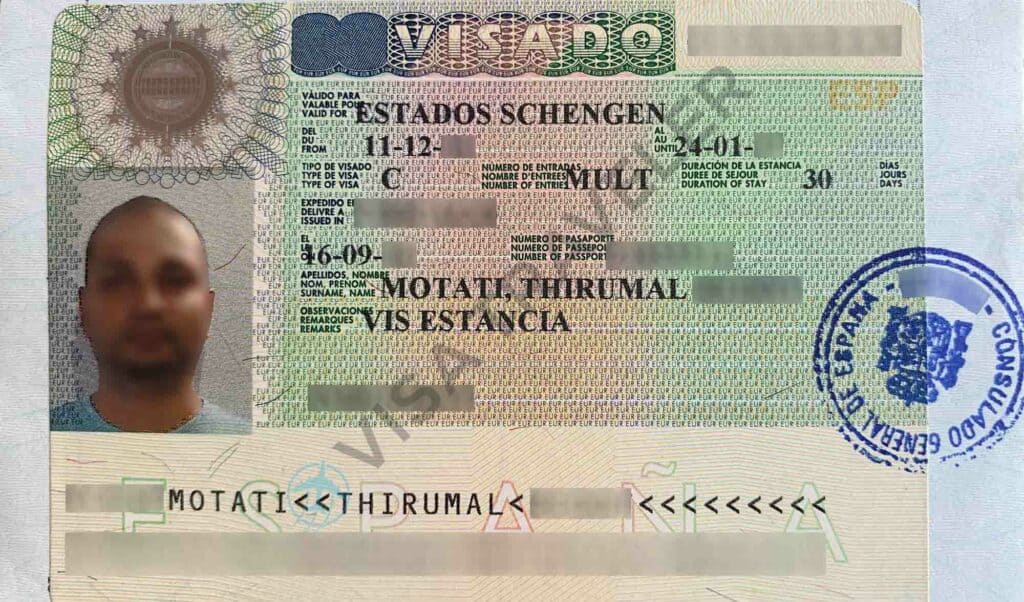
Currently, 104 non-EU nationals require a visa to enter the Schengen area. These nationals must be in possession of a Schengen visa when entering the Schengen zone.
Validity of Schengen Visa
The Schengen visa validity depends on whether you are a first-time applicant or a subsequent applicant.
First-time application: If you are applying for the first time, your visa will be valid for the exact number of days you have asked for. In some instances, you may get a few buffer days as additional.
For example, if your itinerary is 12 days, your visa will be valid for exactly 12 days.
As a first-time visa applicant, I suggest adding a few extra days to your itinerary so you will get a few extra days on your visa validity. That way, you can have some flexibility in your travel plans.
First-time Schengen visas are usually single-entry or double-entry.
Subsequent applications: If you are applying for the second or third time, you may likely get a visa valid for 90 days. The visa may likely be multiple-entry.
Rules for obtaining Schengen visa valid for 1, 2 or 5 years
- To obtain a 1-year Schengen visa, you must have obtained and used 3 Schengen visas within the last 2 years
- To obtain a 2-year Schengen visa, you must have obtained and used a 1-year Schengen visa within the last 2 years
- To obtain a 5-year Schengen visa, you must have obtained and used a 2-year Schengen visa within the last 3 years
Duration of Stay in Schengen area – the 90 days/180 days rule
Visa-required passport holders are allowed to stay in the Schengen area for up to 90 days within a period of 180 days. This “90 days in any 180 days” applies to all short-stay visitors to the Schengen area.
- Stays in non-EU countries that are part of the Schengen area (Iceland, Liechtenstein, Norway and Switzerland) are counted in calculating the period of stay compliance with the 90 days / 180-day rule.
Where to apply for Schengen visa
Most tourists plan to travel to more than one country during their Europe trip. The Schengen visa is valid for 27 countries, so you must first determine your Schengen country of application. This helps greatly in avoiding visa delays and refusals.
Follow the below guidelines to determine your country of application.
CASE 1: If you plan to visit only one Schengen country, you must apply for your visa at the consulate of that particular country.
Example: If you are traveling to Spain only, then you must apply for your visa at the Spain Embassy or Consulate.
CASE 2: If you plan to visit several Schengen countries, you must apply for your visa at the consulate of the country of your main destination (the country where you will be spending most days).
Example: If your itinerary is 10 days of which 4 days in Spain and 6 days in France, then you must apply for your visa at the French consulate since you will be spending more time in France.
CASE 3: If you intend to visit several Schengen countries but do not have a main destination (same amount of days in each country) then you should apply for your visa at the consulate of the country of your first point of entry.
Example: If your itinerary is 10 days of which you will be spending 5 days in the Netherlands first and 5 days in France after, then you must apply for a visa at the Netherlands Consulate since the Netherlands is your first port of entry.
When to apply for Schengen visa
You must apply for your Schengen visa no later than 15 days prior to your travel. Otherwise, your application will not be accepted.
You can apply for your visa up to 6 months in advance. So, apply as soon as you can to avoid delays, refusals and disappointments.
Schengen Visa Application Process
There is a plan to implement online systems of Schengen visas. But as of now, the visa can only be applied in person. Visa application is a 4 step process
- Fill out your Schengen visa application form 14076-02 (online or offline)
- Schedule an in-person Schengen visa appointment (at the consulate or visa agent such as VFS Global)
- Appear in person to submit your visa application, documents, biometrics and visa fee
- Pick up your original passport with the approved visa.
You can apply for a Schengen visa through a visa/travel agency in some countries. Travel agencies that offer vacation packages to Europe usually are allowed to apply for the visa on your behalf.
Documents required for Schengen visa
The following documents are required for your Schengen visa.
- Filled and signed visa application form (online or downloadable from the consulate page)
- Original passport
- Copy of the visa/residence permit if applying in a third country
- One recent passport-size photo
- Confirmed round-trip flight reservation
- Proof of health insurance
- 3-month bank statement
- 3-month salary slips
- Original signed employment letter
- Cover letter with a detailed itinerary
Application Form
Filling out the application form can be done online or offline depending on the Schengen country. For example, the application form for France is online whereas for Spain, it’s paper.
Photo Requirements
The photo must be 4.5cm x 3.5cm. That is, 4.5cm high and 3.5 cm wide. The face must be 3.2 to 3.6cm or 70-80% of the photo.
Proof of Health Insurance
It’s MANDATORY to submit travel medical insurance for Schengen visa . You must attach a certificate of travel health insurance in the Schengen area or worldwide with 100% coverage with no deductibles or co-pays.
It must have a minimum coverage of €30,000 EUR for medical, hospitalization, emergencies and repatriation services.
You can purchase Schengen travel insurance from any online provider. You can cancel and get a refund if your visa is denied. Once you purchase the travel insurance for your desired dates, you can download the visa letter that you can submit with your visa application.
Recommended Schengen visa insurance:
- VisitorsCoverage | Meets Schengen visa insurance requirements | Costs $1 a day
Schengen Visa Fee
The Schengen visa fee for an adult is approximately €80 EUR. For children between the ages of 6 and 12, it’s €40 EUR. Children under the age of 6 are exempt from paying the visa fee.
The fee must be paid in local currency, in the form of cash or bank money order. Most Schengen consulates have outsourced the visa process to VFS or BLS. Therefore, in addition to the visa fee, you may have to pay a fee for biometric collection and courier services.
Schengen Visa Processing Time
Schengen visa processing can take from 15 calendar days to 45 calendar days depending on the consulate, country or agent. Apply no later than 15 days prior to your travel. Otherwise, your application will not be accepted.
ENTRY AND EXIT PROCEDURE AT THE AIRPORT
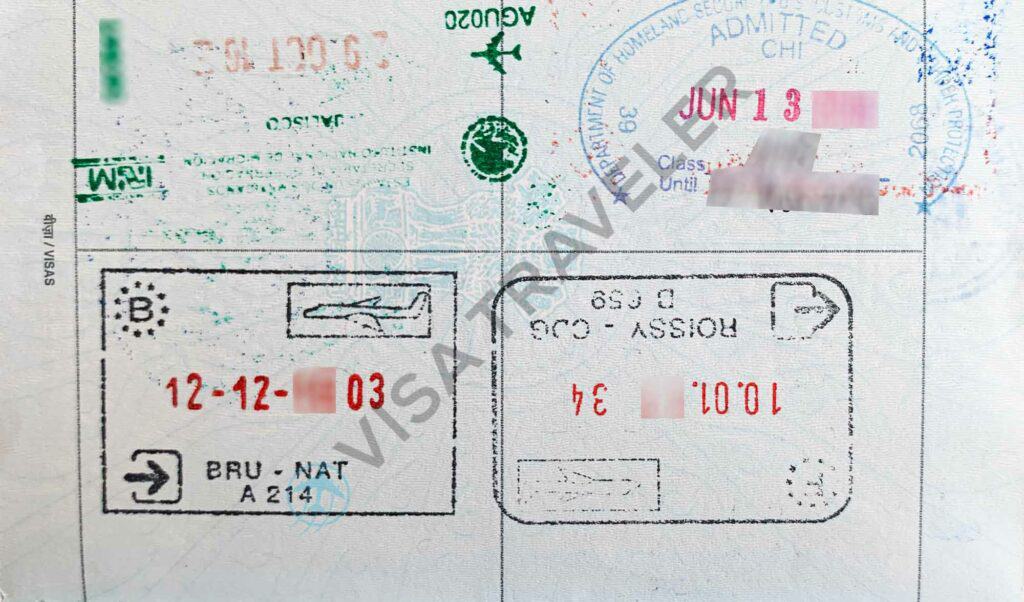
Entering Schengen Zone by Air
You do not need to fill in any arrival/departure card on entering the Schengen area. Do not panic if your flight attendant did not give you an arrival/departure card on your flight.
At the immigration, you will generally be asked about your final destination, places you will be visiting and the number of days you are planning on staying. You might also be asked if it is your first time in Europe.
The immigration officer will stamp your passport upon arrival. The number of days you are allowed to stay will not be marked on your passport.
As always, carry a copy of your return ticket and hotel booking just in case. If you are traveling on a one-way ticket, don’t forget to get proof of onward ticket .
Leaving Schengen Zone by Air
You must go through passport control on exiting the Schengen area. You will not be asked any questions unless you have overstayed your visa. Passport control is fairly quick, about 10-15 minutes depending on the airport.
FREQUENTLY ASKED QUESTIONS (FAQs)
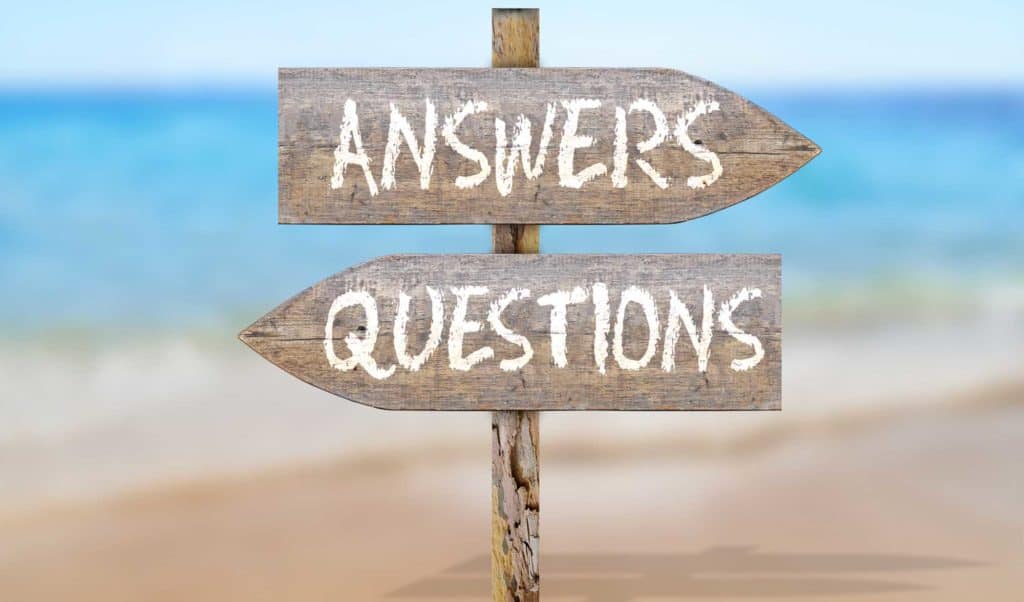
What is the minimum bank balance required for a Schengen visa?
The minimum bank balance required for a Schengen visa depends on the country you are applying from and the duration of your stay. As a general rule, you should have at least €60 per day for your stay in the Schengen area. This should cover your travel expenses, including accommodation, food, and transportation.
Does Schengen visa cover Switzerland?
Yes, the Schengen visa covers Switzerland. Switzerland is a member of the Schengen Area. You can travel to Switzerland and other Schengen countries with a single visa.
Which Schengen visa is hardest?
There is no specific Schengen visa that is considered the hardest to obtain. But visa refusal statistics show that Norway, France and Belgium have the highest refusal rates.
Which country gives fastest Schengen visa?
The processing time for a Schengen visa may vary depending on the country you are applying from and the purpose of your visit. However, some countries may have faster processing times than others. For example, Estonia, Latvia, and Lithuania are known to have relatively fast processing times.
Which country gives Schengen visa easiest?
There is no specific country that gives Schengen visa easiest. But visa refusal statistics show that Finland, Hungary, Estonia and Poland have the lowest refusal rates.
Do US citizens need a visa to enter the Schengen area?
No, US citizens do not need a visa to enter the Schengen area. US citizens can travel to the Schengen territory for up to 90 days within any 180-day period without a visa for tourism or business purposes.

Europe is usually the first choice for most first-time international travelers. It’s a dream for most people to visit European countries at least once in their lifetime. Europe has such an impeccable beauty, history, art, and cuisine.
A Schengen visa allows you to travel freely within the Schengen area, comprised of 27 European countries. Non-EU nationals who are visa-exempt and visa-required are allowed to stay in the Schengen zone for up to 90 days within a 180-day period.
Schengen visas are single, double or multiple-entry visas. First-time Schengen visas are limited in validity, but subsequent visas are 90 days to 5 years of validity.
- European Comission, Migration and Home Affairs
- European Union Law (EUR-Lex), Visa Code
WRITTEN BY THIRUMAL MOTATI

Thirumal Motati is an expert in tourist visa matters. He has been traveling the world on tourist visas for more than a decade. With his expertise, he has obtained several tourist visas, including the most strenuous ones such as the US, UK, Canada, and Schengen, some of which were granted multiple times. He has also set foot inside US consulates on numerous occasions. Mr. Motati has uncovered the secrets to successful visa applications. His guidance has enabled countless individuals to obtain their visas and fulfill their travel dreams. His statements have been mentioned in publications like Yahoo, BBC, The Hindu, and Travel Zoo.
PLAN YOUR TRAVEL WITH VISA TRAVELER
I highly recommend using these websites to plan your trip. I use these websites myself to apply for my visas, book my flights and hotels and purchase my travel insurance.
01. Apply for your visa
Get a verifiable flight itinerary for your visa application from DummyTicket247 . DummyTicket247 is a flight search engine to search and book flight itineraries for visas instantly. These flight itineraries are guaranteed to be valid for 2 weeks and work for all visa applications.
02. Book your fight
Find the cheapest flight tickets using Skyscanner . Skyscanner includes all budget airlines and you are guaranteed to find the cheapest flight to your destination.
03. Book your hotel
Book your hotel from Booking.com . Booking.com has pretty much every hotel, hostel and guesthouse from every destination.
04. Get your onward ticket
If traveling on a one-way ticket, use BestOnwardTicket to get proof of onward ticket for just $12, valid for 48 hours.
05. Purchase your insurance
Purchase travel medical insurance for your trip from SafetyWing . Insurance from SafetyWing covers COVID-19 and also comes with a visa letter which you can use for your visas.
Need more? Check out my travel resources page for the best websites to plan your trip.
LEGAL DISCLAIMER We are not affiliated with immigration, embassies or governments of any country. The content in this article is for educational and general informational purposes only, and shall not be understood or construed as, visa, immigration or legal advice. Your use of information provided in this article is solely at your own risk and you expressly agree not to rely upon any information contained in this article as a substitute for professional visa or immigration advice. Under no circumstance shall be held liable or responsible for any errors or omissions in this article or for any damage you may suffer in respect to any actions taken or not taken based on any or all of the information in this article. Please refer to our full disclaimer for further information.
AFFILIATE DISCLOSURE This post may contain affiliate links, which means we may receive a commission, at no extra cost to you, if you make a purchase through a link. Please refer to our full disclosure for further information.
MORE VISA GUIDES

UNITED KINGDOM

VIEW ALL VISA GUIDES
- Cookie Policy
- Copyright Notice
- Privacy Policy
- Terms of Use
- Flight Itinerary
- Hotel Reservation
- Travel Insurance
- Onward Ticket
- Testimonials
Search this site

Schengen Visa Minimum Bank Balance: What You Need to Know
- Visas & Passports
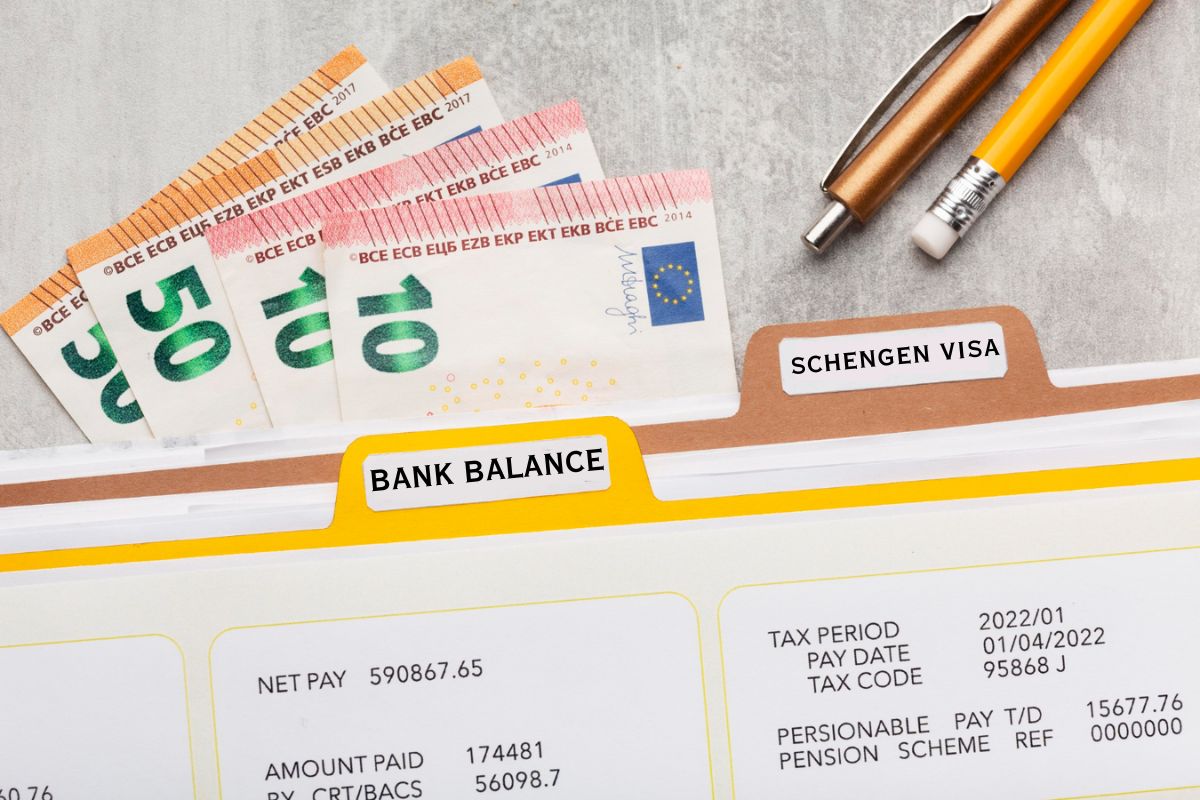
Planning a trip to any of the captivating nations in the Schengen area? Exploring Europe’s diverse cultural heritage, stunning landscapes, and lively cities is undeniably an exciting prospect.
However, applying for a Schengen visa requires you to meet specific criteria, including proving that you have enough financial resources to support yourself during your trip. This is where the minimum bank balance comes in.
What is the Schengen Visa Minimum Bank Balance?
The Schengen visa minimum bank balance is the amount of money that you must have in your bank account to prove that you can support yourself during your trip to the Schengen area. The required amount varies depending on the country you are visiting and the length of your stay.
How to Calculate the Schengen Visa Minimum Bank Balance
To calculate the Schengen visa minimum bank balance, you will need to multiply the daily required amount by the number of days you plan to stay in the Schengen area. For example, if the daily required amount is EUR 50 and you plan to stay for 10 days, you will need to have a minimum of EUR 500 in your bank account.
Also Read: Schengen Visa Application Guide for Winter Holiday Travellers
Schengen Visa Minimum Bank Balance by Country
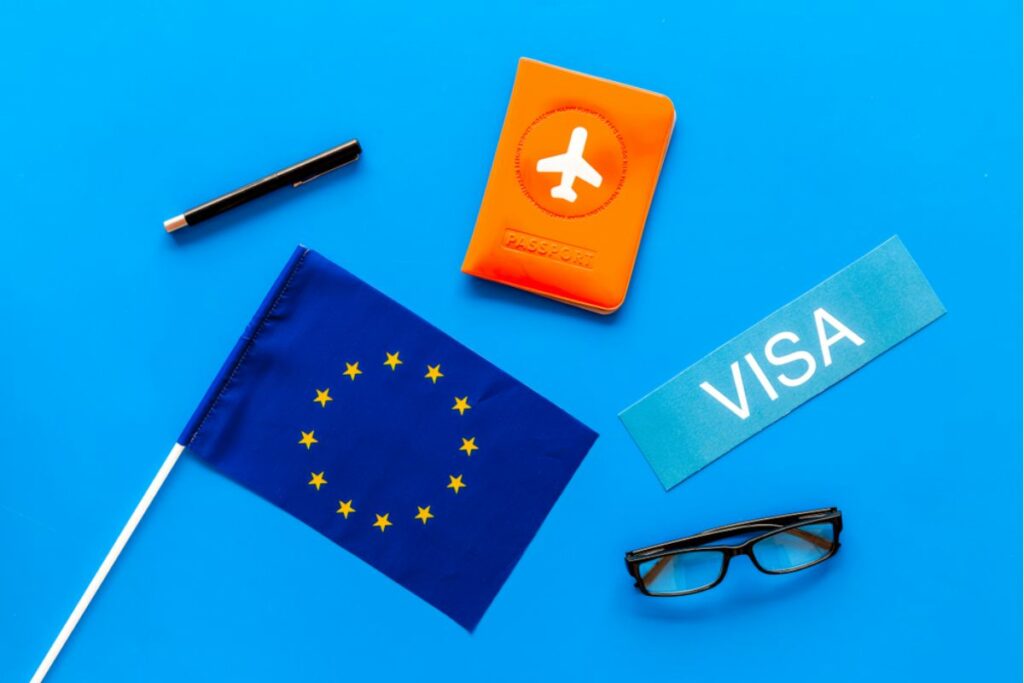
When applying for a Schengen visa to Austria, there isn’t a fixed minimum bank balance specified by the Austrian Embassies and Consulates. Instead, they evaluate each case individually, taking into account factors like the purpose, nature, and duration of your intended stay.
As a general guideline, it’s advisable to budget a minimum of EUR 100 per day, which represents the average daily expenditure for a tourist in Austria. In certain situations, other forms of payment, such as cash, traveller’s cheques, credit cards, bank guarantees, or letters from economically stable residents of Austria, may be accepted as evidence of sufficient funds.
Belgium requires applicants to demonstrate the availability of sufficient financial resources for their stay. If you plan to stay with a friend or family member, you can provide a letter of guarantee signed by your host in Belgium, authenticated by the municipal administration of their residence.
This letter assures that your host will cover all your financial expenses during your stay.
Additionally, you must prove that you have a minimum daily amount of EUR 45 available for expenses while in Belgium. If you’ll be staying in a hotel, the required daily amount increases to approximately EUR 95, and you must also have a valid return ticket.
Entering Croatia may necessitate proof of adequate funds to cover expenses during your stay, return, or onward travel. According to the Croatian Immigration Office, travellers are typically required to demonstrate financial means of €95 per day for hotel accommodation or €45 per day for more budget-friendly lodging options.
4. Czech Republic
The Czech Republic outlines specific reference amounts for short-term stays based on the duration of your visit:
- For stays up to 30 days: Minimum of CZK 1,565 per day.
- For stays exceeding 30 days (up to a maximum of 90 days): Minimum of 15 times CZK 3,130, with an additional 2 times CZK 3,130 for each full month.
Denmark mandates that individuals applying for a Schengen visa must have financial resources amounting to DKK 350 per day. Additionally, applicants must provide evidence of sufficient funds for their return trip, including a valid return ticket.
When entering Estonia without an invitation letter, you need to demonstrate financial means equal to 0.2 times the monthly minimum salary set by the Government of the Republic, which is currently approximately EUR 130.80 per allowed day of stay. Alternatively, if someone in Estonia invites you, they will be responsible for covering your expenses.
Finland assesses the sufficiency of funds on a case-by-case basis, but approximately EUR 30 per day is generally considered necessary for expenses, depending on accommodation arrangements and sponsor availability.
For a French visa , having at least EUR 65 per day is a general requirement. However, the amount may vary depending on your accommodation arrangements:
- Staying with a family member or friend who invited you: Half of the minimum wage, which is EUR 32.50 per day.
- Hotel reservation: EUR 65 per day.
- Partial hotel reservation (with a few days reserved): EUR 65 per day for reserved days and EUR 120 per day for the remaining days without a reservation.
- No accommodation arrangements: Minimum of EUR 120 per day.
Germany requires proof of a minimum of EUR 45 per day when applying for a Schengen visa. Visa assessments consider various factors, including the duration of your stay, accommodation, and the purpose of your visit. Accepted forms of proof include cash, credit cards, checks, and various guarantees.
Foreign nationals, excluding European Union Member State nationals, need EUR 50 per person per day for subsistence in Greece, with a minimum total of EUR 300 for stays up to 5 days. For minors, these amounts are reduced by 50%.
11. Hungary
For entry to Hungary, a reference amount of HUF 10,000 per entry is required for third-country nationals or family members of EEA citizens. Various forms of certification for means of subsistence are accepted.
12. Iceland
Iceland’s legislation requires proof of adequate financial resources, typically ISK 4,000 per person. When someone else assumes responsibility for costs, the required sum is halved, making it ISK 20,000 minimum entry amount per traveller.
For Italian visas, the minimum bank balance varies based on the number of days and travellers:
- 1 to 5 days: EUR 296.60 for one individual, EUR 212.81 for two or more individuals.
- 6 to 10 days: EUR 44.93 for one individual, EUR 26.33 for two or more individuals.
- 11 to 20 days: EUR 51.64 and EUR 36.67 (daily sum per person) for one individual, EUR 25.82 and EUR 22.21 (daily sum per person) for two or more individuals.
- More than 20 days: EUR 206.58 and EUR 27.89 (daily sum per person) for one individual, EUR 118.79 and EUR 17.04 (daily sum per person) for two or more individuals.
To enter and stay in Latvia, you must demonstrate funds of EUR 14 per day of your stay.
15. Liechtenstein
Applicants for a Schengen visa to Liechtenstein must have a minimum of CHF 100 per day in their bank account to cover expenses.
16. Lithuania
The minimum daily amount required for stays in Lithuania is EUR 40 per person.
17. Luxembourg
To travel to Luxembourg, the reference amount is based on the minimum wage for an unskilled worker, approximately EUR 67 per day. The amount adjusts proportionally to the duration of your stay.
18. Netherlands
In the Netherlands, border control officials generally consider a basis of EUR 55 per person per day as a means of subsistence. However, this amount can vary based on the duration of your stay, the purpose of your visit, and individual circumstances.
Norway assesses required funds on a case-by-case basis, with factors such as duration of stay, accommodations, return tickets, and stay guarantees considered. As a general indication, EUR 48 per day is often sufficient for visitors not staying with relatives or friends.
Poland’s regulations specify different amounts depending on the circumstances:
- Stays up to 4 days: At least PLN 300.
- Stays exceeding 4 days or other specific conditions: PLN 75 per day.
- Educational, scientific, research, or development purposes: Minimum of PLN 1,270.
- Additional financial resources required for return journey expenses vary based on nationality.
21. Slovakia
Slovakia requires EUR 56 per person per day, comprising various expense categories such as accommodation, meals, and spending money.
22. Slovenia
In Slovenia, the daily subsistence amount is EUR 70 for individuals and 50% of EUR 70 for minors accompanied by their parents or legal representatives.
Spain’s visa requirements depend on factors like the minimum interprofessional salary, the duration of stay, and the number of travellers. A minimum of EUR 100 per person per day, with a minimum of EUR 900 for those staying in Spain, is often required.
Sweden sets a reference amount of SEK 450 per day for crossing the border.
25. Switzerland
Foreign nationals covering their expenses during their Swiss stay must provide proof of around CHF 100 per day. Students with a valid student card may need approximately CHF 30 daily.
Schengen Visa – Minimum Bank Balance
For the convenience of our readers, we have also compiled the following table showing the Schengen visa minimum bank balance for each Schengen country:
How to Prove that You Meet the Schengen Visa Minimum Bank Balance Requirement
To prove that you meet the Schengen visa minimum bank balance requirement, you will need to submit a bank statement that shows that you have the required amount of money in your account. The bank statement should be no more than 30 days old.
Additional Tips
- It is important to note that the Schengen visa minimum bank balance is just a minimum requirement. You may want to have more money in your bank account to cover unexpected expenses.
- If you are staying with a friend or family member, you may be able to provide a letter of support from them instead of a bank statement. The letter of support should state that your friend or family member will be covering your expenses during your stay.
- If you are a student, you may be able to provide a copy of your student ID card instead of a bank statement.
Meeting the Schengen visa minimum bank balance requirement is an important step in applying for a Schengen visa. By understanding the requirements and calculating the required amount, you can ensure that you have the best chance of having your visa application approved.
Follow and connect with us on Facebook , Twitter , LinkedIn , Instagram and Google News for the latest travel news and updates!
Manish Khandelwal
Manish Khandelwal, a travel-tech enthusiast with over a decade of experience in the travel industry. Founder and Editor-in-Chief of Travelobiz.com, he's passionate about writing.
Trending now


Schengen Visa Financial Requirements: Minimum Balance & Info
Last Updated : 03 May 2024
30-Second Summary
One of the main requirements is the means of subsistence proof.
List of items to show you have enough money for the Schengen financial requirements:
Bank Statements
Proof of Accommodation
Prepaid Travel Services
Sponsorship Letter (if applicable)
Employment Verification (if applicable)
Income Tax Returns (if applicable)
Financial Guarantees (if applicable)
Property or Investments (if applicable)
The required amount can vary depending on the Schengen country you plan to visit.
If you travel to any Schengen country, you must apply for a Schengen Visa . The Schengen Visa requires you to submit travel documents during your Schengen visa application. Although most of the Schengen visa financial requirements are the same for each Schengen member state, the means of subsistence are unique to each country.
What Does Means Of Subsistence Entail For A Schengen Visa?
If you plan to travel to any country in the Schengen Area , you must apply for a Schengen Visa . During your application process , the Embassy or Consulate of the Schengen country you plan to visit will require you to submit a list of required documents.
One of the main requirements is the means of subsistence proof. This document proves you have the financial means to travel and stay in a Schengen country. The minimum bank balance for Schengen visa is calculated through your main destination's living standards.
What Are The Financial Requirements For Each Schengen Country?
The Austrian Federal Ministry for Europe, Integration, and Foreign Affairs does not specify the amount of essential means of subsistence you require to apply for an Austrian Schengen Visa .
The amount of financial resources, or means of sustenance, is then implicitly regulated on an individual or case-by-case basis.
The Belgian Immigration Office states that anyone applying for a Belgium Schengen Visa must prove a financial subsistence of at least 95 EUR per day if they stay in a hotel.
However, if you plan to stay in cheaper accommodation, you can prove that you have at least 45 EUR per day.
Travelers should have €95 per day if staying in a hotel and €45 when planning to get accommodated by cheaper means.
Suppose you apply for the Czech Republic Schengen Visa . In that case, you must show proof of financial sufficiency of at least 42.50 EUR per day .
Furthermore, if you plan a stay longer than 30 calendar days, you must show evidence of at least 1,274 EUR and an extra 170 EUR by the end of each month.
According to the Denmark Visa Code, if you apply for the Denmark Schengen Visa , you must prove financial sufficiency of at least 67.24 EUR per day . Remember that this is only applicable if you are staying in a hotel.
However, suppose you plan to stay in a hostel or any other cheaper means of accommodation. In that case, you must present proof of financial sufficiency of at least 47.07 EUR per day. Alternatively, if you already paid for your accommodation in advance, or it is paid by a third party. Then, your financial entry requirements will be lower.
Suppose you apply for the Estonia Schengen Visa . In that case, you must prove financial means by demonstrating you have at least 100 EUR per day for the period of your stay in Estonia.
The Ministry of Foreign Affairs in Finland requires you to provide proof that you have at least 30 EUR per day if you apply for the Finland Schengen Visa .
According to the European Commission, if you want to enter France by applying for a France Schengen Visa , you must attest to financial sufficiency of at least 120 EUR per day .
However, if you can prove that you have already paid for your accommodation in France, you only must have at least 65 EUR per day. Please also remember that if you choose cheaper accommodation like hostels, the minimum daily amount decreases to 32.25 EUR.
Suppose you want to apply for the German Schengen Visa . In that case, you must provide evidence that you meet the daily requirements of 45 EUR daily .
All foreign nationals, including citizens of non-Schengen countries, must attest to possessing an amount of 50 EUR per day .
In addition, if you plan on staying for more than 5 days, you must prove a minimum of 300 EUR when applying for a Greece Schengen Visa .
Suppose you plan on entering Hungary by applying for a Hungary Schengen Visa . In that case, you must pay the minimum requirement of 3.19 EUR for each entry.
There is no other quantity of means of subsistence that you must demonstrate to the Hungarian Embassy or Consulate while applying for a visa.
Entering Iceland by an Iceland Schengen Visa , you must attest that you have at least 28.83 EUR per day. Additionally, you must pay an entry fee of 144.13 EUR each time you enter the Icelandic territory.
The financial entry requirement when going to Italy on an Italy Schengen Visa is specified to the number of days you will be spending in Italy. Here is a list of the minimum financial requirements that you must meet:
For stays of 5 days: an overall amount of 269.60 EUR (212.81 EUR for two or more people)
For stays of 6-10 days: 44.93 EUR per person (26.33 EUR for two or more people)
For stays of 11-20 days: 36.67 EUR per person (22.21 EUR for two or more people)
For stays over 20 days: 27.89 EUR per person (17.04 EUR for two or more people)
You must attest that you have at least 14 EUR per day if you go to Latvia by applying for a Lativa Schengen Visa . Let me explain by using an example.
If you stay for 10 days, you must have at least 14 EUR per day. In that case, the overall amount is 140 EUR for your stay.
You must attest to the Liechtenstein Embassy or Consulate that you have at least 92.34 EUR per day if you enter with a Liechtenstein Schengen Visa .
However, if you are a student with a valid student ID, you are only required to prove a financial subsistence of 27.70 EUR per day.
Suppose you want to apply for the Lithuania Schengen Visa .
In that case, you must provide evidence that you meet the daily requirements of 40 EUR . This means you must have at least 40 EUR per day during your stay in Lithuania.
When applying for a Luxembourg Visa at a Luxembourg Embassy or Consulate , Luxembourg does not specify a specific quantity of means of subsistence for Schengen visa.
Suppose you apply for the Malta Schengen Visa . In that case, you must show proof of financial sufficiency of at least 48 EUR per day .
According to the European Commission, if you want to enter the Netherlands by applying for a Netherlands Schengen Visa , you must attest to financial sufficiency of at least 34 EUR per day .
According to the European Commission, Section 17 (f) of the Norwegian Immigration Act states that if you want to enter Norway through a Norway Schengen Visa , you must have at least 53.34 EUR per day .
The financial entry requirement when going to Poland on a Poland Schengen Visa is specified to the number of days you will be spending in Poland. Here is a list of the minimum financial requirements that you must meet:
For stays of 3 days: overall amount of 67.76 EUR
For stays over 3 days: 22.59 EUR per day
If your accommodation is paid before traveling or paid by a third party: 4.52 EUR per day
Entering Portugal by a Portugal Schengen Visa , you must attest that you have at least 40 EUR per day . Additionally, you must pay an entry fee of 75 EUR each time you enter Portugal.
However, if you can provide your food and accommodation is covered, you might be exempt from paying the money mentioned above.
According to the European Commission, if you want to enter Slovakia by applying for a Slovakia Schengen Visa , you must attest to financial sufficiency of at least 56 EUR per day .
Suppose you apply for the Slovenia Schengen Visa . In that case, you must show proof of financial sufficiency of at least 70 EUR per day . Furthermore, if you apply for a minor, proof of financial support for a visitor's visa is reduced to 35 EUR.
You must show proof of financial support for a visitor visa such as the Spain Schengen Visa . You must show support of at least 100 EUR a day .
According to the European Commission, you must prove financial support for a visitor visa of 48.26 EUR per day if you apply for a Sweden Schengen Visa .
You must attest to the Switzerland Embassy or Consulate that you have at least 92.34 EUR per day if you enter with a Switzerland Schengen Visa. However, if you are a student with a valid student ID, you are only required to prove a financial subsistence of 27.70 EUR per day.
Means of Subsistence for Schengen Visa
In the context of a Schengen visa application, "means of subsistence" refers to the various ways you can prove your financial capacity to support yourself during your stay. These means can include :
Personal Bank Statements: Provide your personal bank statements that clearly show a consistent balance above the minimum requirement.
Sponsorship: If someone else is financially supporting your trip, you will need an official sponsorship letter , along with their financial documents.
Financial Guarantees: Some countries accept financial guarantees, such as a deposit or bond, to cover your expenses.
Prepaid Travel Services: If you have already paid for your accommodation, flights, or other services, you can use these as evidence of your financial preparedness.
More Details About The Schengen Visa
The Schengen Tourist Visa is considered a short-stay visa. The validity and duration of stay in the Schengen Area is 90 days in a 180-day period .
Although some citizens enjoy visa-free travel to the Schengen Area, they must also abide by the 90/180-day rule .
If you are an EU citizen, you also enjoy visa-free travel to any Schengen member state and the EU/EEA.
If you want to apply for a Schengen Visa, you must head over to the Schengen country's Embassy or Consulate . Luckily, we have detailed guides on Schengen Tourist Visa applications . However, we know visa applications can be terrible, so I suggest you apply through AtlysBlack apply through AtlysBlack for expedited visa appointment s.
Please check out each guide by selecting the Schengen country of choice :
Austria, Belgium, Czech, Croatia,Denmark, Estonia, Finland, France, Germany, Greece, Hungary, Iceland, Italy, Netherlands, Norway, Poland, Portugal, Spain, and Switzerland.
The European Union will implement the ETIAS (European Travel Information and Authorization System) at the start of 2023. The ETIA will apply to any citizen who enjoys visa-free travel to the EU.
Therefore, if you are traveling to any Schengen member state before 2023, you don't need to apply for the ETIAS. However, remember that this will change in 2023.
Please feel free to check out our ETIAS guide check out our ETIAS guide for more information on how you will need to apply for it in the future.
Now that you know the financial requirements, I will explain the generic visa requirements that are the same for all Schengen countries. Remember that border control s can ask you for additional information, so always carry hard copies of your documents.
Here is a list of the documents that you must present when applying for your Schengen Visa :
Visa application form : Can be found on the Consulate of the country's website.
Two passport photos : Make sure to check out the photo requirements.
A valid passport : Your passport should be valid for at least 3 months beyond your stay.
Travel Itinerary : A travel itinerary Including the flight itinerary and hotel itinerary.
Travel insurance/Health insurance : The travel insurance must have a minimum of 30,000 EUR that covers the length of your intended stay.
Financial means of subsistence: Bank statements etc.
Cover letter : You should include a cover letter.
Employment Letter : Employment letter that proves you have leave.
required documents needed for the Schengen visa .
Meeting the minimum bank balance requirements for a Schengen visa is a vital step in ensuring your European journey goes smoothly. Remember that each Schengen country may have its own specific criteria, so thorough research and careful planning are essential.
By understanding the financial prerequisites and providing the necessary documents to support your application, you'll increase your chances of obtaining a Schengen visa and embarking on a memorable European adventure. So, get your finances in order, complete the application process, and soon, you'll be exploring the stunning landscapes and rich cultures of the Schengen Area with confidence. Safe travels!
Government Sources
We source our information directly from government authorities, assuring its credibility. Using AI, we simplify intricate concepts for better clarity, and our dedicated team conducts rigorous verification to maintain precision. Rest assured, the information you discover here is dependable, as we exclusively rely on reputable sources.
Travel.State.GOV Travel.State.GOV
German mission in US German mission in US
Frequently Asked Questions
Proof of sufficient funds for travel typically includes bank statements, sponsorship letters, and proof of accommodation . Bank statements should show a consistent balance covering your expenses, while a sponsorship letter confirms financial support from a sponsor. Proof of accommodation can be in the form of hotel reservations or a letter of invitation from a host.
Failing to demonstrate your ability to cover expenses can result in a visa denial. It's crucial to carefully plan and provide the required documentation to meet this requirement.
Yes, you can use a sponsor to meet the financial requirement, but the sponsor must provide a clear commitment to cover your expenses during your stay and provide the necessary financial documentation.
You can demonstrate your means of subsistence by providing relevant documents, such as bank statements, sponsorship letter s, and proof of prepaid services, to show that you have the financial capacity to support yourself during your stay.
The required amount can vary depending on the Schengen country you plan to visit, the purpose of your trip, and the duration of your stay. As a general guideline, having at least €5,000 in your bank account is often recommended.
Yes, you can use a sponsor's bank account to fulfill the financial requirements. However, you must provide an official sponsorship letter from the sponsor, along with their financial documents, to prove their ability to support your trip.
Yes, you typically need to maintain the required minimum bank balance in your account for the entire duration of your stay in the Schengen Area. It's essential to plan your finances accordingly.
Failing to meet the financial requirements can result in your visa application being denied. It's crucial to ensure you have the necessary funds and documentation before applying.
To obtain a Schengen visa for Switzerland, you must demonstrate having funds of at least CHF 100 or €102.48 per day for your planned visit, assuming you are responsible for your travel expenses.
For a Schengen visa in Germany, you must show a minimum bank balance of EUR 45 per day. It is important to have sufficient funds to cover your expenses during your stay in Germany.
Proof of sufficient funds for travel to Italy can be established by presenting original bank statements issued within the past month, stamped and signed by an authorized bank official. These statements should demonstrate your ability to financially support your trip.
Yes, bank statements are commonly used as proof of the minimum bank balance. They should cover a specific period leading up to your visa application date and demonstrate a consistent balance above the required minimum.
There are no specific age restrictions. However, all applicants, including minors, must demonstrate their financial capacity to cover expenses during their stay.
A 3-month bank statement is typically required to demonstrate your financial stability and your ability to cover expenses during your stay in the Schengen Area. It provides a comprehensive overview of your financial situation leading up to your visa application.
The amount of money required to sponsor a tourist visa varies based on the destination country, the purpose and duration of the visit, and the cost of living in that country. It's crucial to check the specific financial requirements of the embassy or consulate of the country where the visa application will be submitted for accurate details on the necessary funds to show.
Proof of sufficient funds for travel typically involves providing bank statements or financial documents that demonstrate you have the necessary financial means to cover your expenses during your trip, including accommodation, food, transportation, and other essential costs. These documents serve as evidence to immigration authorities that you can support yourself during your stay in a foreign country without relying on public funds or assistance.
The visa fee is 80 EUR for adults. You can learn more about the Schengen visa application .
According to the European Parliament and The Council, the Regulation (Ec) No 810/2009 establishes a Community Code on Visas known as the "Visa Code." The Visa Code stipulates the following:
Article 14 (c):
"Documents indicating that the applicant possesses sufficient means of subsistence both for the duration of the intended stay and for the return to his country of origin or residence, or for the airport transit to a third country into which he is certain to be admitted, or that he is in a position to acquire such means lawfully, in accordance with Article 5(1)(c) and (3) of the Schengen Borders Code." - European Parliament and The Council of the European Union .
Article 21 (5):
"The means of subsistence for the intended stay shall be assessed in accordance with the duration and the purpose of the stay and by reference to average prices in the Member State(s) concerned for board and lodging in budget accommodation, multiplied by the number of days stayed, based on the reference amounts set by the Member States in accordance with Article 34(1)(c) of the Schengen Borders Code. In addition, proof of sponsorship and/or private accommodation may constitute evidence of sufficient means of subsistence." - European Parliament and The Council of the European Union .
Proof of sufficient means of subsistence for travel in Europe includes recent bank account statements from the last three months, reflecting the name and address of the account holder. It is important to note that Travel Money Cards and cash are not accepted as proof of funds.
Indeed, you can submit your Schengen visa application to one embassy or consulate and, upon approval, journey to another Schengen country. Typically, Schengen visas are granted with the primary destination or the initial Schengen nation you intend to visit in mind. After securing the visa, you have the freedom to move within the Schengen Area and explore other member nations, provided you comply with the visa's stipulations, such as the length of stay and the purpose of your visit.
Visas in Under a Week


Dominican Republic Visa & Tourist Card: Application and Requirements
Dominican Republic Tourist Visa
Discover travel requirements for US citizens visiting the Dominican Republic. Stay informed on entry requirements for a seamless visit.

Ethiopia tourist visa: Easy application process for travelers
Ethiopia tourist visa
Explore Ethiopia hassle-free with the e-visa for US citizens. Secure your visa online for a seamless travel experience. Apply now!

Ethiopia Visa For U.S. Citizens: E-Visa Application
Ethiopia E Visa
Apply for an Ethiopian visa - Get your Ethiopian Evisa here and travel to the ancient country with its colorful history.

Enter If You Dare! Spookiest Haunted Destinations In Egypt
Scariest Destinations To Visit In Egypt
Knock Knock - Who's There? The Ghost Of Your Past! Haha, I know, funny. But nothing funny about these 10 scariest places in Egypt.

Philippines One Health Pass Registration And Requirements
Philippines One Health Pass
this post covers everything you need to know about the One Health Pass for the Philippines. This includes the application process, requirements and Philippines covid-19 restrictions.
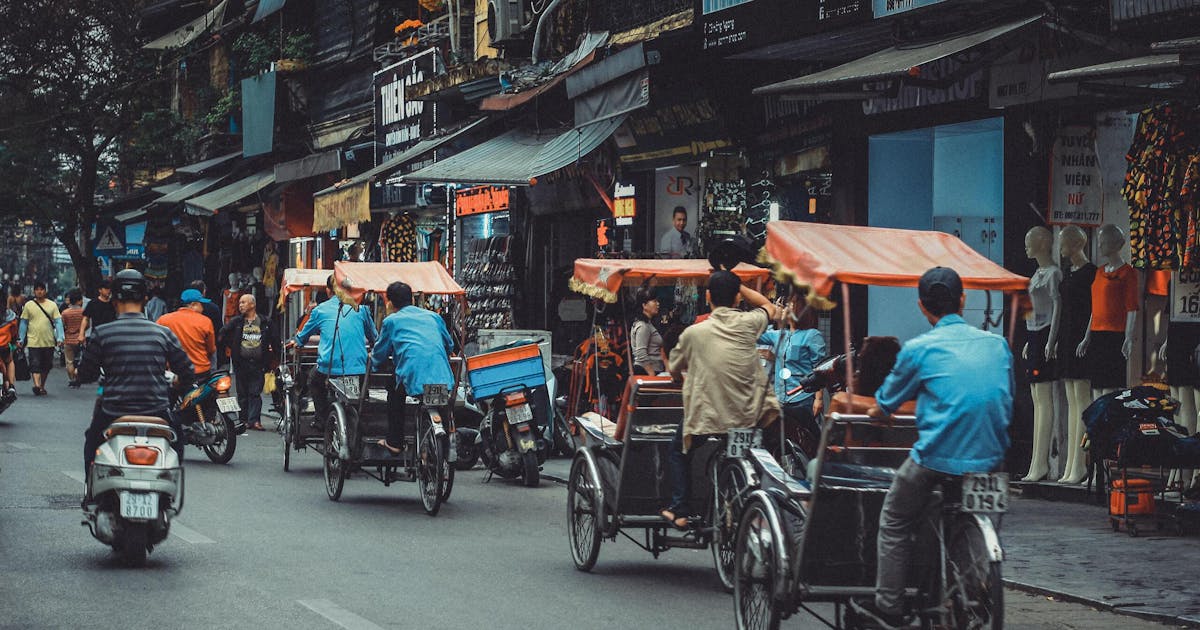
Vietnam E-Visa Payment Issues And Solutions
Vietnam E Visa Payment Issues
This post will help you if you're struggling to pay your Vietnam e-Visa. Some tips and tricks on how to complete the payment process without issues.
Instant Visas

Barbados Visa From US: Costs, Visa Process, And Entry Requirements
Barbados Visa Requirements
In this post, you'll learn about everything you need for a Barbados Visa. Including if you need one, the Barbados visa requirements, the application process, and costs.

The Nepal Tourist Visa For US Citizens: Requirements, Application Process, And Fees
The Nepal Tourist Visa For Us Citizens
In this blog, I talk about how to get a Nepal visa for US citizens, the visa fees, and the processing time

Revealed: These Are The Most Visited Cities In The World 2023
The Most Visited Cities In The World
Discover the most visited cities in the world. Read about why these destinations are so popular and special in the eyes of international travellers.

St Lucia Visa | US Citizens and US Green Card Holders
Travel To St Lucia
Discover the process of obtaining a St Lucia visa for US Green Card Holders. Learn entry requirements, application steps, fees, and visa validity.
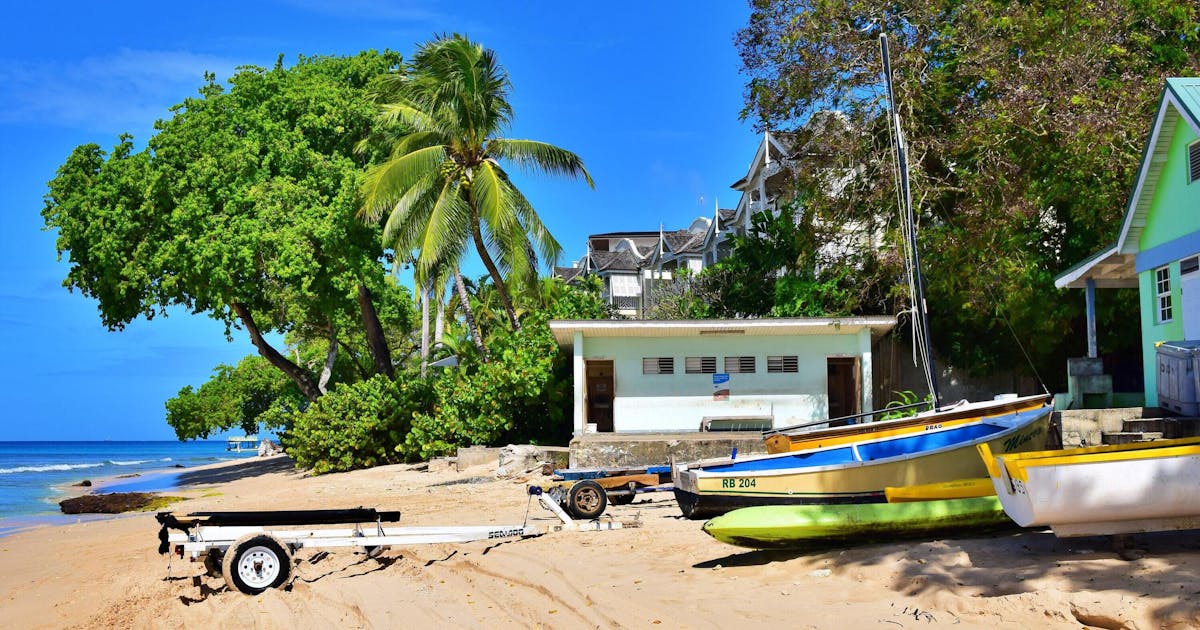
Barbados Digital Nomad Visa: Welcome Stamp Requirements
Barbados Digital Nomad Visa
This post covers everything you need to know about the Barbados Digital Nomad Visa. It includes the application process, required documents and visa requirements.

Malawi visa for US Citizens
Malwai visa for US citizens
US citizens enjoy visa-free entry to Malawi. Learn about fees, visa-extension, US green-card holder requirement and more
Visa Guaranteed on
Schengen Visa
- Table of contents
What is a Schengen Visa?
Who needs a schengen visa, uniform schengen visa (usv), limited territorial visa (ltv), airport transit visa (atv), duration and validity, completed visa application form, passport-sized photos, travel itinerary, travel insurance, proof of financial means, purpose of visit documentation (if required), fee payment, post-application steps, interview process, where to apply, cost and fees, processing time, etias: (european travel information and authorization system), schengen visa faq.
A Schengen Visa is a document that allows travelers to enter the Schengen Zone and stay for a total of 90 days in 180 days. It encourages short-term stays and is applicable for purposes including tourism, business visits, attending events, visiting friends or family, or medical treatment. This makes it possible for travelers to cross international borders within the Schengen Zone without undergoing border checks or encountering passport control, making travel significantly more efficient.
There are 29 countries within Europe that make up a zone called the Schengen Zone. These 29 countries have abolished passport controls at their mutual borders. The primary purpose of this is to streamline the process for travelers, making it possible for them to visit multiple countries in Europe without the hassle of obtaining separate visas for each country. This not only simplifies travel logistics but also facilitates travel across the region.
The countries within the Schengen Zone as of 2024 are: Austria, Belgium, Bulgaria, Croatia, Czech Republic, Denmark, Estonia, Finland, France, Germany, Greece, Hungary, Iceland, Italy, Latvia, Liechtenstein, Lithuania, Luxembourg, Malta, Netherlands, Norway, Poland, Portugal, Romania, Slovakia, Slovenia, Spain, Sweden, and Switzerland.
Citizens from the following countries are required to obtain a Schengen Visa before entering the Schengen Zone: Afghanistan, Algeria, Angola, Armenia, Azerbaijan, Bahrain, Bangladesh, Belarus, Belize, Benin, Bhutan, Bolivia, Botswana, Burkina Faso, Burma/Myanmar, Burundi, Cambodia, Cameroon, Cape Verde, Central African Republic, Chad, China, Comoros, Congo, Côte D’ivoire, Cuba, Democratic Republic of Congo, Djibouti, Dominican Republic, Ecuador, Egypt, Equatorial Guinea, Eritrea, Ethiopia, Fiji, Gabon, Gambia, Ghana, Guinea, Guinea-Bissau, Guyana, Haiti, India, Indonesia, Iran, Iraq, Jamaica, Jordan, Kazakhstan, Kenya, Kosovo, Kuwait, Kyrgyzstan, Laos, Lebanon, Lesotho, Liberia, Libya, Madagascar, Malawi, Maldives, Mali, Mauritania, Mongolia, Morocco, Mozambique, Namibia, Nepal, Niger, Nigeria, North Korea, Northern Mariana Islands, Oman, Pakistan, Papua New Guinea, Palestinian Authority, Philippines, Qatar, Russia, Rwanda, Sao Tome and Principe, Saudi Arabia, Senegal, Sierra Leone, Somalia, South Africa, South Sudan, Sri Lanka, Sudan, Suriname, Swaziland, Syria, Tajikistan, Tanzania, Thailand, Timor-Leste, Togo, Tonga, Tunisia, Turkey, Turkmenistan, Uganda, Uzbekistan, Vietnam, Yemen, Zambia, and Zimbabwe.
Some countries have agreements with the Schengen Area countries that allow their citizens to enter without a visa for a stay of up to 90 days within 180 days for purposes including tourism and business. Visa waiver agreements are formal agreements between countries that allow citizens from one country to enter another country without needing to hold a visa for a specific amount of time within certain conditions. Typically, these agreements are based on factors including diplomatic relations and economic interests. Examples of visa-exempt countries include the United States, Canada, and Australia.
Types of Schengen Visas
There are several Schengen visa types, each one designed to accommodate a different purpose of travel. With each visa catering to different needs and durations, it is important to understand the purpose of your trip and the length of time you plan on staying in the Schengen Zone to properly determine which visa is best for you.
The Uniform Schengen Visa is the most common type of Schengen Visa. Also known as the C-Type Schengen Visa. The USV is a short-stay Schengen Visa and is for purposes such as tourism, business, family visits, and medical treatment within the Schengen Zone. This consists of the Schengen Tourist Visa , Schengen Business Visa , and Schengen Student Visa . With the USV, you are allotted a total of up to 90 days within 180 days.
The Limited Territorial Visa is issued for visits to specific countries within the Schengen Area, rather than entry into the entirety of the Schengen Zone. you will be restricted to the specific Schengen countries, or even just one single country, depending on your needs. This type of visa is most commonly granted if the applicant’s circumstances only require entry into certain countries. Similarly to the Uniform Schengen Visa, the Limited Territorial Visa allows for a stay of up to 90 days in every 180 days. This visa may be suitable for you if you need to only visit particular countries in the Schengen Zone, for activities such as business meetings, conferences, cultural events, or family visits restricted to only visiting one country or a number of specific countries.
- There are two types of Airport Transit Visas. The first is the A-Type Transit Visa. This allows for airport transfer in the Schengen Area when the traveler is not permitted to depart the airport. The Airport Transit Visa is issued to travelers who are transiting through the Schengen Area without actually entering the Schengen country they are transiting through. It permits them to stay within the international transit area of the airport without passing through border control to enter the country. The A-Type Schengen Transit Visa is typically only valid for a very short duration, usually between 24 and 48 hours, but this depends on the length of your layover. Needing an Airport Transit Visa is dependent on the nationality of the traveler. Citizens of certain countries may not need to obtain an Airport Transit Visa if they are connecting through a Schengen airport.
- The B-Type Transit Visa is valid for 5 days and allows the traveler to exit the airport and explore the Schengen Area for a total of 5 days on the way to their final destination.
Most Schengen Visas allow for multiple entries, but this is dependent on every specific situation. You will find on your visa sticker “Number of entries” with either “1”, “02”, or “MULT” underneath it. This indicates whether you are allowed single entry, double entry, or multiple entry into the Schengen Zone.
The duration of stay allowed with a Schengen Visa depends on the type of visa that is issued. Typically, Schengen Visas allow for short stays of up to 90 days in 180 days. This means that during any 180-day period, you can stay in the Schengen Zone for up to 90 days combined. For example, if you enter Austria and stay for 30 days and then go to a non-Schengen country for 30 days, when you return to the Schengen Zone, it will be your 31st day of your 90-day eligibility. Your visa will state the duration of stay allowed and the validity period. It is essential that you distinguish the difference between the validity period and the duration of stay allowed. A Schengen Visa may be valid for 2 years, but you are only allowed to stay within the area for up to 90 days during that 2-year validity period.
Holders of Schengen Visas are typically allowed to travel freely throughout the Schengen Area. There are no international border controls between Schengen countries. It is essential to abide by the restrictions permitted within your visa. You should not exceed your permitted stay or engage in activities that you have not been permitted to do, such as working if you only have a Tourist Schengen Visa.
In general, Schengen visas are not eligible to be extended or renewed. If you wish to stay in the Schengen Area longer than the duration of your visa, you will most likely be required to apply for a new visa from your home country. There are exceptions that may be made in case of any unforeseen circumstances, such as medical emergencies or natural disasters where a traveler may be granted a short-term extension. If you wish to change the purpose of your visit, it is likely that you will be required to exit the Schengen Area and apply for the appropriate visa from your home country.
Requirements and Documentation
When applying for a Schengen Visa, applicants will need to submit a set of required documents to the consulate or embassy of the country they intend to visit.
Applicants must fill out the official Schengen Visa application form provided by the consulate or embassy of the destination country. This form includes information such as personal details, travel information, and other relevant data. It is important to complete this form with 100% accuracy.
A passport with at least three months of validity beyond the intended departure date from the Schengen Area is required. It must have at least two blank pages available.
You must submit recently taken passport-sized photos meeting the specifications outlined by your consulate or embassy. The photos must be identical and taken in the last 6 months.
You will be required to submit a travel itinerary, including details of your trip, such as flight reservations, hotel bookings, and any other travel arrangements.
You must have proof of travel insurance with coverage valid for the entire duration of your stay. The insurance policy must provide minimum coverage for medical emergencies.
Evidence of financial means to cover the cost of your trip is required. This may be with bank statements, proof of employment, or financial sponsorship.
Depending on the purpose of your travels, you may be required to submit supporting documents related to the purpose of your trip. This may be a letter of invitation from a business, enrollment letters from a university, or documents proving family visits.
You will be required to pay the visa fee, which varies based on your nationality, age, and visa type. The fee is non-refundable.
Application Process
While applying for a Schengen Visa may seem like a daunting process, with careful planning and attention to detail, it is relatively straightforward. To ensure a smooth application process, it is recommended to familiarize yourself with the requirements and steps involved. As of 2024, the Schengen Visa application process is not done online, it must be done at the embassy or consulate in your country of residence or through a Visa Application Center.
The first step to applying for a Schengen Visa is to fill out the visa application form. You can find this on the website of your country’s embassy, consulate, or visa application center. Make sure to fill this out completely and accurately.
Schedule an appointment with your consulate or embassy. The procedure for appointment scheduling will differ based on where you are applying, so check the consulate’s website for instructions.
Bring all of the required documents in an orderly manner to your appointment. Make sure you are prompt and look presentable. You may be asked to provide biometric data, such as fingerprints or a photograph at your appointment.
At your appointment, you will be required to pay the visa fee. Make sure to identify your specific visa fee before arrival. Accepted payment methods vary based on the embassy/consulate, so consult your embassy before arrival.
After submitting your application, you must wait for them to process it. During this time, you may be called in to attend an interview. Processing times may vary depending on the volume of applications. Check the website for estimated processing times.
Once your application has been processed, you will be notified that you can pick up your passport. Collect your passport and prepare for travel. When you pick up your visa, make sure to double-check all of the information to ensure accuracy, including your name, passport number, and validity period.
Now that you have your visa in hand, you can travel to the countries of the Schengen Area! Make sure to follow any instructions given to you by immigration officials and abide by your visa regulations.
Not all citizens of all nationalities will require an interview while applying for a Schengen Visa, but some may require one. The purpose of the interview is to gather additional information about you and your travel plans. Make sure you are prepared with the details of your trip, such as places you plan to visit, the duration of your stay, and plans for returning to your home country. During the interview, make sure to be polite, respectful, and cooperative. Be honest and confident. It is important to dress appropriately and arrive on time for your interview.
You can apply for a Schengen Visa at either an embassy, consulate, or visa application center in your country. The embassy, consulate, or visa application center where you submit your visa application depends on where you will be traveling. If you are only planning on visiting one country, you will submit your application to the embassy, consulate, or visa application center for that country. If you are planning on visiting multiple countries, you should apply to the country where you are planning on spending the most amount of time. If you are planning on visiting multiple countries for equal amounts of time, you should apply at the embassy, consulate, or visa application center of the country you plan on entering the Schengen Area through. You must apply at the embassy, consulate, or visa application center located in your home country or the country where you reside.
The Schengen Visa cost depends on several factors, including the applicant’s nationality, age, type of visa, and specific policies of the consulate or embassy processing the application. Typically, a Schengen Visa fee is around 80-120 euros for anyone older than 12 years old. In addition to visa fees, you may incur additional charges, including the price of travel insurance, biometric data collection fees, and any fees required from your embassy or consulate. Some countries may offer reduced or waived fees for certain applications, such as children under 12, students, researchers, or participants in exchange programs. It is essential for applicants to review the specific fees and requirements of the consulate or embassy where they will be applying.
The typical Schengen Visa processing time varies depending on a number of factors, including the specific embassy or consulate, the nationality of the applicant, and the type of visa applied for. In general, the standard processing time is around 15 business days. The processing time may be affected based on the embassy’s workload, your nationality, the time of year, the type of visa you are applying for, and the completeness of your application. If there is missing or incomplete information within your application, there may be delays while the additional information is requested. It is advisable to apply well in advance before your planned travel to allow for sufficient time for processing. In some cases, you may be able to request expedited processing for an additional fee. If you need expedited processing, you should check with your consulate or embassy, or the visa application center about your options and the associated fees.
Travel insurance is an essential requirement for Schengen Visa applicants. It serves as a safety net to protect you from unforeseen circumstances and provides financial coverage in case of emergencies. Your travel insurance must be valid for the duration of your stay in the Schengen Area and provide minimum coverage of at least 30,000 euros for medical expenses. Your coverage should cover all countries within the Schengen Zone as well as any countries you plan to visit outside of the Schengen Area.
ETIAS is an electronic travel authorization system for visa-exempt travelers visiting the Schengen Area. It was designed to enhance security and streamline border control procedures. All travelers from visa-exempt countries will be required to apply for the ETIAS. The process is entirely online through the official ETIAS website. You will need to complete an application form providing your personal information and travel details. The fee for the ETIAS is 7 euros for those 18 and older. It is processed electronically and typically only takes a matter of minutes. Requirements include a valid passport and details of your travel itinerary.
The difference between the ETIAS and Schengen Visas is that the ETIAS is primarily designed for visa-exempt travelers. The process of applying is significantly easier, and the price of the ETIAS is substantially lower. Both the ETIAS and Schengen visas allow travelers to visit the Schengen Zone for various purposes, including tourism and business.
Depending on your specific visa and the circumstances, you can have a single-entry Schengen visa, double-entry Schengen Visa, or multiple-entry Schengen Visa. When applying, you should check the regulations of your visa to ensure it meets your specific travel needs.
If your Schengen Visa application is rejected, you should be notified of the reason. You have the option to either appeal this decision or address the issues and reapply for a new visa. Some consulates, embassies, or visa application centers may have a period you must wait before applying for another visa.
While the basic systems remain the same for all Schengen Zone countries, different countries may have their own specific procedures, policies, or requirements. For example, you may find that the process for applying for a Greek Visa is different than applying for a German Visa, thanks to varying procedures between the two embassies.
Check if you need a visa for your next destination
Latest news and articles.

Greece unveils visa-on-arrival program for Turkish tourists to 10 islands

Ireland imposes visa requirements on citizens of Dominica, Vanuatu, and Honduras

The essential traveler's guide to understanding various types of visas

How Much Bank Balance is Required for Germany Tourist Visa
Traveling to Germany can be an exciting experience, but before you pack your bags, there are some essential steps to follow, especially if you require a tourist visa. One crucial aspect of the visa application process is meeting the financial requirements set by the German authorities. In this article, we will explore the bank balance required for a Germany tourist visa and other relevant financial aspects to help you prepare for a smooth application process.
Understanding the Germany Tourist Visa
Germany is a popular tourist destination known for its rich history, picturesque landscapes, and vibrant culture. If you plan to visit Germany for tourism purposes and you are from a country that is not part of the European Union (EU), European Economic Area (EEA), or Switzerland, you will need to apply for a Schengen visa. The Schengen visa allows you to travel freely within the Schengen Area, which includes Germany and 25 other European countries.
Financial Requirements for a Germany Tourist Visa
To ensure that visitors can support themselves financially during their stay, Germany requires applicants to demonstrate sufficient funds. The financial requirements are in place to prevent potential financial burdens on the German government and to guarantee that tourists have a comfortable stay without relying on public assistance.
Minimum Bank Balance Criteria
The exact bank balance required for a Germany tourist visa can vary depending on the duration of your stay and your planned itinerary. As a general guideline, you should have at least 45 to 60 euros per day for the entire duration of your visit. If you plan to stay for ten days, you should have a minimum of 450 to 600 euros in your bank account.
Additional Financial Proofs
While the minimum bank balance is a crucial factor, German authorities also consider other financial proofs to assess your financial capability. These may include:
- Proof of accommodation reservation (hotel bookings or invitation letter from a sponsor)
- Return flight tickets or travel itinerary
- Health insurance coverage for the entire duration of your stay
- Proof of employment and income (payslips, employment letter)
- Tax documents and property ownership (if applicable)
Supporting Documents for the Visa Application
When applying for a Germany tourist visa, you will need to submit several supporting documents along with your visa application. These documents are essential to demonstrate your intent to return to your home country after your visit and your ability to finance your stay in Germany adequately.
Demonstrating Financial Capability
To meet the financial requirements, applicants need to provide well-organized and genuine documents that reflect their financial capability. Here are some tips to ensure a successful application:
Bank Statements
Provide bank statements for the past three to six months to showcase your financial stability. Ensure that your bank statements clearly indicate your account balance, transactions, and personal details. Keep in mind that the balance should align with the required minimum bank balance for the duration of your stay.
Affidavit of Support
If you are being financially supported by a family member, friend, or sponsor, include an affidavit of support. This document should state that the sponsor is willing and capable of financially supporting you during your stay in Germany.
Tips for a Successful Visa Application
Aside from fulfilling the financial requirements, consider the following tips to increase your chances of a successful visa application:
- Submit your application well in advance to avoid any last-minute complications.
- Be truthful and accurate while providing information and supporting documents.
- Include a cover letter detailing the purpose of your visit and your travel plans in Germany.
- Attend the visa interview (if required) well-prepared, with all necessary documents in hand.
- Maintain a positive attitude during the application process.
Common Reasons for Visa Rejection
Visa rejections are possible, and it is essential to understand some common reasons why they occur:
- Insufficient funds or discrepancies in financial documents.
- Lack of a solid travel itinerary or unclear travel plans.
- Failure to provide genuine and verifiable supporting documents.
- Overstaying in previous travels to Schengen countries.
- A history of visa violations or misuse.
Obtaining a Germany tourist visa can be a straightforward process if you meet the financial requirements and provide accurate and complete supporting documents. Adequate financial planning is crucial to ensuring a smooth and successful application. Remember to maintain transparency throughout the process and provide authentic information to the German authorities.
F requently Asked Questions
Can i use my credit card statement as proof of financial capability.
Yes, you can include credit card statements as long as they show sufficient available credit to cover your expenses during your stay.
Is it mandatory to have a sponsor for a Germany tourist visa?
No, sponsorship is not mandatory. However, having a sponsor can strengthen your application, especially if you don’t meet the financial requirements independently.
How long does it take to process a Germany tourist visa?
The processing time can vary, but it typically takes around 15 days. It is advisable to apply well in advance to allow for any unexpected delays.
Can I extend my Germany tourist visa while I’m in the country?
In most cases, Schengen tourist visas cannot be extended. You must leave the Schengen Area and reapply for a new visa if you wish to return.
What should I do if my visa application is rejected?
If your visa application is rejected, you have the option to appeal the decision or reapply with corrected and additional documents.
Do you need a Tourist Visa for Germany?
Contact our team of skilled immigration lawyers to discuss your visa and immigration needs.
Call us on +234 812 5505 986 or WhatsApp us at +234 818 1547 085 for immediate assistance with your situation.
We are available to assist you in person, over the phone, or online.
- Schengen Visa - Start Here
- Guides Comprehensive Step-By-Step Guides About the Schengen Visa Requirements & Application Process
- Statistics Get the latest and most up-to-date Schengen Visa and Europe tourism statistics
Home > Blog > Guides > Schengen Visa Bank Statements
Schengen Visa Bank Statements
on 22 Nov, 2021
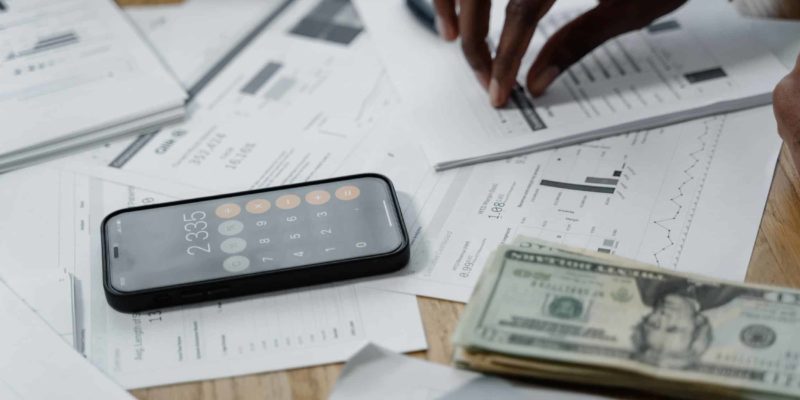
Guide – Bank Statements For Your Schengen Visa Application
What are the bank statements for your schengen visa application.
A bank statement is a document (also known as an account statement) that contains the summary of your financial transactions (bank balance, deposits, charges, withdrawals, interests earned on the account, etc.) that occurred at a certain bank during a month (most of the time it is one month, but it could be one quarter in some cases).
A bank statement is a document that provides a full overview of your account for a specific period.
Some banks can record your statements on file for at least five years, sometimes longer. A one-month statement doesn’t necessarily last from the first to last day of a calendar month.
Some banks can also track your account from the fifth day of a month to the fourth day of the following month.
Submitting the bank statements as proof of financial means is a mandatory requirement when applying for a Schengen Visa, no matter your employment status or your purpose of entry into the Area.
Some Embassies/Consulates require the statements of the last 3 months while some others require the statements of the last 6 months.
However, no matter the Embassy you apply to, we recommend that you submit your bank statements for the last 6 months – more is better.
Please be aware of the following rules when applying for a Schengen Visa:
- If you are able to cover all of the expenses for your trip yourself, then you must submit your own bank statements
- If you have a sponsor, you will have to provide both your bank statements and the ones of your sponsor (all of them for the last 6 months) – together with your sponsorship letter and other mandatory requirements.
The main purpose of these documents is to prove that you have enough funds to support all of the expenses during your stay within Europe. They are a key element during your Schengen Visa application process .
Please note that providing bank statements from only yourself or yourself and your sponsor that cumulatively show that you do not have enough funds on your account can cost you the approval of the Schengen Visa.
These documents will show the Schengen Visa officers not only the type of transactions that occurred within your account, but also the details of those transactions (for example, the name of the person or the institution that transferred money into your account).
This is the main reason why we do not recommend you borrow money from your parents, relatives, or friends so that you can have a higher amount of “show money” (the colloquial term used to indicate the funds that you must have when you travel in order to get a Visa) .
The Schengen Visa officers are experts at spotting irregularities and this can lead to the rejection of your Schengen Visa. They will also check on your account the opening date because a new account may raise suspicions.
Note : You can submit the statements corresponding to more bank accounts.
For example, you can submit the statements corresponding to your both current and savings account. Or, you can submit the statements corresponding to accounts opened in different countries (e.g., you are a Filipino citizen resident in India and submit bank statements corresponding to the accounts you hold in India and the Philippines).
You can also submit the bank statements related to a joint account (whether you opened the joint account together with a relative or a business partner).
Important: If you are self-employed, you must also submit a company bank statement for the last 6 months and a copy of your business license. This is a mandatory requirement for applicants who are running their own businesses.
Thus, there are two categories of bank statements you must submit if you’re self-employed: personal and company bank statements. Both of them are important as part of the Schengen Visa application process.
The Importance Of The Bank Statements For Your Schengen Visa
You may ask yourself why it is so important to the Embassies/Consulates that you submit the bank statements together with the rest of your documents. Below you will find the answers:
- Your bank balance (as well as the one of your sponsor – if you have one) will show the Visa officers you have enough funds to cover your basic travel expenses and other needs.
In case you are still asking yourself ” Why do I need to prove that I have enough money to spend during my trip? ” the answer is: ” The Schengen Visa officers want to ensure that you won’t be a burden for the countries within the Schengen Region and you have enough financial means to support yourself in an emergency ”.
- They provide strong evidence of your intentions to return to your country of residence, by showing you have current living expenses and salary operating out of your account – Bear in mind that most of the rejected Schengen Visa applicants were not able to prove that they intend to go back to their country of residence after their journey in the Schengen Region.
How To Get A Bank Statement For Your Schengen Visa Application?
There are two ways you can get the bank statements of the latest 6 months:
1. Getting the bank statements online
The online mode refers to the electronic version of your bank statements that you can get in a PDF format once you login to your account through the bank’s net banking portal or mobile banking app.
After you download the PDF file (not a screenshot), you can print it off and submit it to the Embassy/Consulate together with your other documents.
Here are the steps you should follow:
- Log into your bank account – You can do it directly from your computer or using a mobile banking app.
- Select “Statements” (“Bank Statement” or “E-Statements”) – Although every bank is different and the Internet banking portals are not identical, you should easily find the option that allows you to download your statements.
- Select the appropriate account (in case you have more than one account at the same bank) and the statement period (you can also submit statements from multiple accounts, but each one must have a 6 months minimum of statements).
- The bank should send the list of statements for the selected period on the email address corresponding to your account – or you can download it directly as a PDF if your bank Internet portal allows you to do that.
- Print off the statement (colour printing is preferred).
Remember that most of the banks allow you to access a one-month bank statement meaning that you will have to download and print off six different statements (of the latest 6 months).
2. Getting the bank statements offline
There are a few banks that do not provide the option to download or print the statements via net banking portal or mobile banking app. If your bank is one of them, you have two options:
- Send a letter or email or call to your bank and ask for your statements of the last 6 months (you should receive them by email) – this step does require a lot of verification as it is virtual.
- Visit your bank branch and request the statements you need over the counter.
Remember that you also have two options when submitting the bank statements together with all the rest of the documents for your Schengen Visa application:
- Submit the account statements you got after following one of the methods mentioned above.
- Submit the bank statements with the authorised signature of the bank (you can ask one of the representatives of your bank to sign and stamp each one of them).
Providing bank statements that have the evidence and proof of the bank with authorised signature is NOT mandatory and no Embassy/Consulate mentions that specifically.
Nevertheless, you can do that if you would like to provide additional proof to the Schengen Visa officers. This choice can also depend on the type of statements provided by your bank. On some of them it can be written on one of the top corners that the statement is “valid without the signature and the stamps of the bank” (in this case, it would be completely useless to submit them with the signature and the stamp of the bank, even when you want to bring additional proof the the Schengen Visa officers).
What Are The Key Elements Of A Bank Statement For The Schengen Visa Application?
It is easy to understand a bank statement as it contains only basic information about you and your account. The most important elements of a bank statement that you submit for your Schengen Visa application are:
● Your bank balance
In case you are asking yourself how much money you should have on your account, the answer is “ it depends on your destination country ”.
However, most Embassies/Consulates mention a specific amount of money that you must have in your account so that your Schengen Visa can be approved. As a general rule, we do not encourage you to show the Visa officers that you intend to travel with less than 60 EUR a day, for each day that you are going to spend within the Schengen Area. (e.g., if you are travelling for 10 days, we recommend you to have at least 600 EUR in your account, no matter your destination(s) within Europe).
For further information concerning the minimum amount of money that you must have in your account for each Schengen Country, you can check our Financial Means Test .
● The correspondence between the details on your bank statements and the ones on your other documents
If you are going to cover all of the expenses for your trip within the Schengen Area, you must provide information about you as an employee – for example, you should provide a Certificate of Employment /Employment letter and a No Objection Letter (NOC) from your employer.
If on these documents it is written that your salary is 500 EUR per month and your statements show a deposit of 2000 EUR each month, this might raise some suspicion, unless justified in your cover letter .
● The date when the account was open
If you opened your account just a few months before applying for a Schengen Visa, this can raise some red flags too.
The Schengen Visa officers can think that you opened the account just for your application process. A newly opened account will not necessarily lead to the rejection of your Visa, but can reduce your chances of approval.
We would recommend you show to the Schengen Visa officers the statements related to an account opened at least one year before applying for the Visa.
● The regularity of the transactions
The transactions on your account should be regular.
For example, if you show the Schengen Visa officers your bank statements of the last 6 months and they prove you didn’t make any transactions (such as ATM withdrawals or payments) they might think you opened the account with the purpose of having some “show money” and getting the Schengen Visa.
The statements should prove that you use your account regularly.
● The type of transactions
If someone deposits a high amount of money on your account (whether it was once or multiple times), the Schengen Visa officers could think that you borrowed money just for your Schengen Visa application process.
They need to understand clearly where your money is coming from, who is the person (or the institution) that deposits into your account and the reasons why you receive it.
Most of the time, this will just be your salary (which is covered by your employment contract and Employer NOC Letter) but other times it could be your sponsor (if the sponsor is depositing money into your account, please outline that in the Cover Letter).
Common Mistakes To Avoid When Submitting The Bank Statements For The Schengen Visa Application
● submitting the printed screenshots of your bank statements.
The Schengen Visa officers won’t accept them. You must download and print (or print directly from your account) the PDF files that contain the statements related to the transactions you made within the last 6 months.
● Submitting a bank certificate instead of a bank statement
A bank certificate is usually a one-page document that certifies that you have an account with that branch. It does not contain a summary of your financial transactions – and your transactions are exactly the details that the Schengen Visa officers are interested in.
● Submitting bank statements that prove you do not have enough funds to travel
This might be the worst mistake a Schengen Visa applicant can make. Showing to the Schengen Visa officers that you have less than 60 EUR a day to spend in the Schengen Area can lead to the rejection of your Visa (for some Embassies/Consulates also 60 EUR a day could be enough.
Also, we do not encourage you to take the risk and show them you can afford to spend only 60 EUR a day – just remember: more is better).
● Submitting your income summary account
The income summary account is a one-page document that shows only the total bank balance on your account (remember that an account statement must show the history of all your financial transactions such as deposits, charges, withdrawals, interests earned on the account, etc.).
● Submitting the bank statements in your native language
You should submit the bank statements in a language that the Schengen Visa officers know.
For example, if your bank provides statements in Arabic, the Schengen Visa officers might not understand it. Contact your bank and ask if they can provide you with the account statements in English. Otherwise, you should make a certified translation of the statements.
● Submitting bank statements that do not show the details of your transactions
For the Schengen Visa officers it is not enough to see that you made a payment or someone made a deposit into your account, but they also need to understand the details of the transactions (e.g., where or to whom you paid money, or who deposited money into your account).
● Submitting bank statements that do not prove you get the salary mentioned on your employment documents
If you pay for the trip with your own money and need to show the Schengen Visa officers that you are an employee, your bank statements must prove you receive once a month the salary mentioned on your certificate of employment, NOC letter from your employer, or your employment contract.
● Submitting only the first page of a one-month bank statement
Of course, if your bank statement has only one page, submit it as such.
But, for example, if every bank statement you download has 3 pages and you must submit 6 bank statements it means that you will have to show to the Embassy/Consulate officers a total of 18 pages (an easy way to validate is to check the ‘page count’ located at the bottom right corner of each page to ensure you have included every single one).
● Submitting bank statements that do not show consistency with your other documents
Your bank balance must show consistency with your other documents.
For example, if you submit bank statements that show you can afford to spend only 60EUR per day and your hotel reservations show you booked a 5-star hotel class with expensive amenities, this may raise some red flags.
The hotel type you choose must fit your bank balance and budget.
Also, your bank statements and Personal Income Tax Return (ITR) should show consistency and prove you pay income taxes.
Applying for a Schengen Visa with a Sponsor and Need Your Sponsor’s Bank Statements?
If you have a sponsor who will be covering the expenses for your Schengen Area trip, then you have to submit your sponsor’s bank statements as part of your Visa application (together with your own bank statements).
This is a mandatory requirement for all Embassies because Visa officers need to ensure that your sponsor has the financial ability to support your trip to Europe.
Please note that some Embassies require you to submit your sponsor’s bank statements for the last 3 months, while others require you to submit your sponsor’s bank statements for the last 6 months.
We always recommend our clients submit their own bank statements or those of their sponsors for the last 6 months because more is always better.
Make sure you carefully read this guide and let your sponsor know what are the exact steps to follow to get their bank statements (or, you can share this guide with your sponsor to read it and find out how to get their bank statements for your Visa application).
Confused Where To Start?
If you are confused, worried or stuck, the best next step to take is to Get a Free Consultation .
The session takes 5 to 10 minutes, starts immediately and you will get our advice delivered to your inbox by a Visa Expert within 1-2 hours. This is not a video or phone call, it is just like a live chat, where we can understand your situation better and an expert shares what you should do next.
There is no commitment to use our services at all, we just provide you advice based on our assessment of your situation and give you the next steps you need to follow to get your Schengen visa.
Click the Free Consultation button below to get the information you have been searching for
Visas Assoc.
Schengen visa.
- Free Consultation
- Personal Plan
Customer Care
- Privacy Policy
- Terms and Conditions
GET A QUOTE
How to obtain a tourist visa for Spain?
Its culture, its food, its people and sunny beaches, so many reasons to choose Spain as your perfect get away. Before setting off on your Iberian adventure, you need to make sure you have the proper documents to legally enter the country and fully enjoy your trip. Here are a few guidelines to help you apply for a Schengen tourist visa for Spain .
Who needs to apply for a Schengen tourist visa to visit Spain?
The Schengen area includes 27 countries among which Spain. Citizens from non-European countries – such as Russia, China, India and all African nations - need to apply for a Spain Tourist visa if they wish to visit Spain for less than 90 days. Some countries such as the US, Canada, Brazil, Australia and Mexico have visa-free arrangements with the European Union which means that their citizens do not need a visa to visit Spain for stays shorter than 90 days. However starting 2023, they will need to apply for an ETIAS visa waiver to travel. This visa-free arrangement is only valid for citizens of these countries and not their residents. Therefore the need for a Schengen visa depends on your citizenship and not your place of residence.
How long can you stay in Spain on a tourist visa?
A tourist visa for Spain is a category C short stay visa which is granted to visitors who are travelling to Spain for their holiday i.e. for tourism purposes. Your Schengen tourist visa for Spain allows you to stay in the country for 90 days maximum over a 180 day period (the " 90 days rule" in Spain ) . This visa will also allow you to visit other Schengen countries during that time.
How do I obtain a Tourist visa for Spain?
You need to apply at your nearest Spanish embassy, consulate or visa application center if
- Spain is the only Schengen country you are planning to visit
- OR the one where your stay will be the longest (most number of nights) during your Schengen adventures
- OR the first Schengen country from which you will enter the Schengen area.
You will be given an appointment during which your biometric data (fingerprints and photo) will be taken and you will hand in your application file with all the required documents.
What are the documents required with your Tourist visa application for Spain?
For your application to be processed you will need to provide several documents. Here is a list of the basic mandatory documents (original and copy) required when applying for a Tourist Visa for Spain. Additional documents can be asked depending on your personal situation.
Spain tourist visa requirements:
- A completed and signed visa application form
- Your passport . It shouldn’t be older than 10 years, its expiration date should be minimum 3 months beyond the date when you will leave the Schengen area and it should have at least 2 blank pages.
- At least one passport type photograph
- Proof of residence (original and copy): driver's license with current address, voter registration card, student ID, etc
- Proof of immigration status (eg. green card in the U.S.) if necessary
- A health & travel insurance certificate proving that your insurance covers your medical costs for a minimum of 30,000€ in case of health emergencies (hospitalisation, repatriation). It must be valid for the entire duration of your stay in the Schengen area and in all Schengen countries even if you have no plans to visit them.
- Your confirmed roundtrip tickets : travel reservations showing dates of entry and departure from the Schengen area.
- Proof of your social and professional status : a signed letter of employment with salary, proof of self-employment or business ownership, proof of enrolment for students, unemployment document, retirement statement.
- Proof of your financial means : recent bank statements with official bank signature or stamp, letters of sponsorship showing you have the financial means to support yourself during your entire stay.
- Your latest credit card statement
- confirmed hotel reservations for every night of your stay in Spain and the Schengen area with complete information (name, phone number, address and email).
- if you are staying with friends or family they will have to request an official Letter of Invitation issued by the Spanish authorities. You will need to present the original and its copy.
- for cruise ship travellers, booking confirmation by their travel agent with complete itinerary and names of hotels where you will be staying.
- A notarised authorisation letter for applicants under 18
- The visa fee which you will pay at the time of your appointment
How much bank balance is required for Spain visa?
In Spain, you are required to have 90€ per day of stay (10% of the SMI, the Minimum Interprofessional Salary)
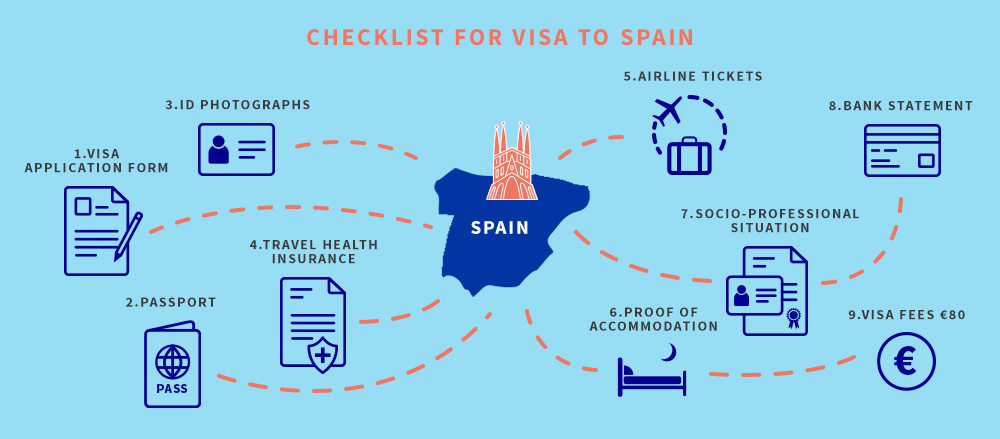
How much does the tourist visa for Spain cost?
A Spain tourist visa costs 80€ for visitors aged 12 and over, 40€ for children ages 6 to 12, free for children younger than 6 years old.
When should you apply for your Tourist visa for Spain?
You cannot apply earlier than 180 days before your planned departure date. It is recommended that you submit your application at least 3 weeks in advance . Delays to issue the visa can vary, on average it takes about 15 working days to be issued.
How do I apply for a student visa to Spain?
Find a detailed guide on how to apply for a Spain student visa here
We are doing our best to provide you the most reliable and updated information possible but rules and regulations concerning visas can be modified at all times by the consulate of your country if circumstances require it. Consequently, we can not be held accountable for these changes. Please contact the Spanish Embassy to obtain the specific terms and conditions in effect at the moment of the submission of your visa application
Get Schengen insurance
Copyright AXA Assistance 2023 © AXA Assistance is represented by INTER PARTNER ASSISTANCE SA/NV, a public limited liability company governed by Belgian law with registered office at Regentlaan 7, 1000 Brussel, Belgium – Insurance company authorized by the National Bank of Belgium under number 0487 and registered with the Crossroads Bank for Enterprises under number 0415 591 055 – RPR Brussels- VAT BE0415 591 055
AXA Travel Insurance Global | AXA Assicurazione Viaggio | AXA Assurance Voyage | AXA Seguros y asistencia en viajes | AXA Seguro de viagem

How Much Bank Balance Do You Need for US Visitor Visa?
We all know that Bank balance plays a crucial part in the case of a successful visa application. When applying for a B1/B2 visa , the first question that pops up in one’s mind is how much bank balance do you need for a US visitor visa?
In reality, a bank balance is not a rigid requirement of a US visitor visa. The US Visa officers don’t care about the bank statement in 90% of the cases. However, potential candidates should always maintain a specific amount of money in their bank.
I will describe particularly on this topic since many possible candidates have confused regarding US tourist visa bank statement requirements.
Sounds great? Let’s get going.
How much money do you need in my bank account for a US tourist visa?
Generally, the US embassy will never ask you to provide the below documents. Yet we will carry some documents as proof.
So, what is financial proof for a US tourist visa? You can bring the following document for financial proof:
- Bank statement
- Fixed deposits
- Share/Stock certificates
- Mutual funds
- Other long-term investment & Credibility
You can bring all documents, or just one, but it is vital to carry your bank statement. Visa officers rarely ask for it, once in a hundred times maybe. If you are that person, then showing the statement will be beneficial. So, keeping the bank statement ready is necessary.
If you are a service holder, you need to bring the savings/salary account bank statement.
Now, the next question arises, what bank statement to carry if you are a business owner? Company account or personal account?
Well, show that one which has a healthy stable transaction. If you have a personal account and a company account in a bank, carry both. Also, if you have an account in multiple banks, consider carrying the bank statement for all banks.
However, be remindful that you carry statements of those accounts where you do frequent transactions, and show a clear pattern of monthly income, expenses, and disposable income. Having a good balance on those accounts will give you additional benefits.
Next, the prime question is, how much bank balance to show?
This question doesn’t have a particular answer. Moreover, you will not get enough information regarding it by visiting the official website of the US embassy. There is no such requirement that applicants must have this much bank balance in their account.
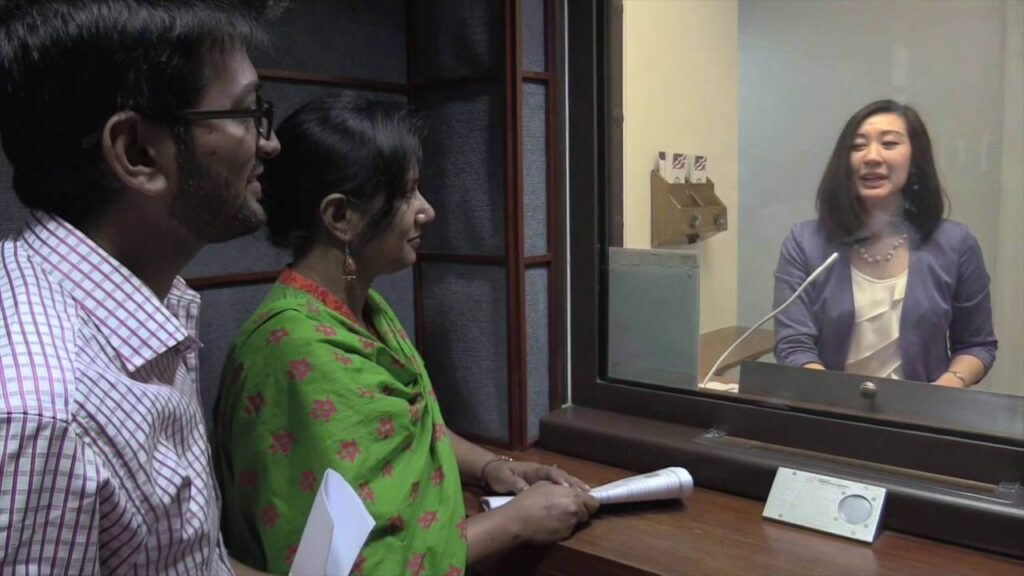
But still, you have to have some preparation. Some factors need to be kept in mind before maintaining a bank balance, such as.
- Are you visiting the USA alone?
- Cities you are planning to visit
- How many days will you be staying in the USA?
- Are any of your family members going with you?
- What will be your accommodation in the USA during the visit?
- Ticket fare
- Traveling different places
- Transportation in the USA
- Other expenses like eating
Let’s assume that you are a family of 4, and your whole family is traveling with you for 8 days.
Considering the above factors, the estimated amount will be at least $3000-$6000 Remember, this estimation considers cost minimization.
So, in order to visit the USA on a b1/b2 visa, your budget should be a minimum of $3000-6000 for a family of 4 members (also include the cost of airfare into this from your destination to the US).
So, what’s the Minimum bank balance for a US visitor visa?
We recommend showing a minimum of $6000-10000$ in your statement. Moreover, the more you can show, it will be of utmost benefit.
Also, don’t consider keeping the balance in your account before applying for the visa. Such an act will not work if the embassy officer checks your bank statement. In this case, your visa will likely be rejected.
Follow the below tip regarding your bank balance.
- Always keep a steady amount in your bank account. If your bank statement shows that your balance never surpassed less than $6000-$10,000 (or equivalent). It means your financial status is good enough. Also, it indicates you will return to your home country after the visit. So, prepare your bank statement accordingly.
Visa embassy officer matters the below point,
- Your profession
- Your monthly income
- Your previous travel history
- Family status
- Your approach during the interview
With all the above points, they understand that you are eligible for the B1-B2 or visitor visa. These points tell that you have enough income to expense daily costs during the trip. Also, your personal information indicates whether you will return after the trip.
The Visa officer looks for the answer to the below 3 prime questions.
- Do you have a solid income source?
- A valid reason for visiting the USA
- Whether you will return to your home country
Therefore, it would always be best to carry your bank statement. Also, keep at least $10,000 in your bank account. Make sure the balance is steady for a minimum of 6 months.
Still, a bank statement or balance is not the B1/B2 visa judging factor. The US visitor visa application process doesn’t actually work that way.
Frequently Asked Questions (FAQ)
Do I have to Show Financial Investments?
Showing Financial investments proves that you have ties in your home country. You should show it if you have financial investments such as commercial property, house, land, etc. This way, your financial profile will become strong.
What financial documents do I have to carry in the visa interview?
Visa officers rarely want to look at your financial or other documents. However, it would always be best to carry the below financial papers.
- Attested bank statement
- Your salary slip (for service holders)
- Income per month
- Proof of all your financial or non-financial investments
The US government mentions no specific minimum balance. However, it is essential to demonstrate sufficient funds. The fund will help you cover the expenses, including travel, accommodation, daily living costs, etc.
Consider the duration of stay, planned activities, and personal circumstances while estimating the cost. These considerations will help you make your daily financial requirements easily.
As mentioned, the visa officer may not ask to show the documents. Having the financial papers handy will be helpful.
7 Common US Visitor Visa Refusal Reasons (& How To Avoid Them)
Greece visa service starts in dhaka, bangladesh, 17 thoughts on “how much bank balance do you need for us visitor visa”.
Good information about visit visa
Hi How Are you
Too much precious information regarding visit visa USA.
I am applicant person I want to get visa USA B1/B2/ so tell me what documents required me
Most Colombians don’t have $6-$10,000 in their bank accounts. How can they obtain a visitor visa to the US without all this money that they don’t have?
I want to apply for a tourist visa to Pennsylvania to attend the Birthday of my fiancee ( Mr. Robert donner) this coming december 4, 2023 may i know what are the requiremts needed so that i can prepare thank you and have a nice day …god bless
My friend wants me to visit them in Texas..im from Philippines..is it possible and how long it takes in processing…?
Save My details to allow me obtain a tourist visa to Niagara falls USA
how much do really need and for how many mo nths
My boyfriend is in Pakistan so we are trying to make him US visa so that he can come to visit..so what are the documents that he needs ?
My brother son want to visit u s a He is in India I am in us What I can do
Hi i am applying for a us visa for the purpose i will be accompanied my parents goin to US since theyr already senior We will be visiting my sister in Texas USA. what are the requirements that i be needing to prepare in order to get a visit visa in the USA ?
Hey I’m willing to relocate to USA immigration how can I work on this?
I want to visit my brothers in US any help please
I think, you will come to the correct decision.
My girlfriend and I are truckers. We have our own rig and travel from Canada to USA regularly and back to Canada. However because of the Tyranny of our government leaders we no longer want to live in Canada but want to take up residence in USA. Are there some states that will accept us as asylum seekers .
There’s no need for any amount in Bank for the visitor visa. Nobody will ask you for it. So relax and go for your visa interview.
Leave a Comment Cancel reply
Save my name, email, and website in this browser for the next time I comment.

IMAGES
VIDEO
COMMENTS
The required financial means for Czech short-term visa applicants is 2,980 CZK or €127.40 (as of July 2022). The current amount varies according to the duration of the intended short-term stay in the country of the Czech Republic: Stays not exceeding 30 days 一 1,490 CZK or €63.70.
Switzerland requires CHF 100 or €102.48 per day, reduced to CHF 30 or €30.72 for students. Obtaining a Schengen visa is a gateway to the breathtaking beauty and diverse cultures of Europe. Amid the paperwork and preparations, the minimum bank balance requirement stands as a fundamental pillar. Ensuring you meet or exceed this requirement ...
One of the main ways you can prove this is by submitting your bank balance statements. The minimum amount of money you need to have to apply for a Schengen visa depends on the Schengen country you want to visit. For example, if you are visiting Spain, you need at least €100 per day. So, for a one-week trip to Spain, you have to prove you have ...
The required bank balance for a Schengen visa varies based on the country, duration of stay, and personal finances. Each country has its regulations regarding the minimum daily balance or within a specific range. ... To travel to Luxembourg, the reference amount needed is based on the minimum wage for an unskilled worker, which is approximately ...
The minimum bank balance required for a Schengen visa depends on the country you are applying from and the duration of your stay. As a general rule, you should have at least €60 per day for your stay in the Schengen area. ... A Schengen visa allows you to travel freely within the Schengen area, comprised of 27 European countries. Non-EU ...
Although the Schengen Area has a 'Visa Code' designed to boost the uniformity between states, given the differing levels of prices in various countries, each applies their own rules on means of subsistence. Belgium applies different levels of means of subsistence ( €45 and €95) to those who stay in hotels or cheaper accommodation ...
To calculate the Schengen visa minimum bank balance, you will need to multiply the daily required amount by the number of days you plan to stay in the Schengen area. For example, if the daily required amount is EUR 50 and you plan to stay for 10 days, you will need to have a minimum of EUR 500 in your bank account. Advertisement.
The Schengen Tourist Visa is considered a short-stay visa. The validity and duration of stay in the Schengen Area is 90 days in a 180-day period. Although some citizens enjoy visa-free travel to the Schengen Area, they must also abide by the 90/180-day rule.
Here we will provide you with a checklist of the documents you need to meet the Schengen Visa requirements: Valid passport with more than three months left until it expires, and older passports with past visas on them, if you possess them. Please ensure that the passport has 2 blank pages to affix visa.
6. As far as the financial means requirement is concerned, each country submitted guidelines to the EU commission. For Belgium you need either EUR 45 or EUR 95 per day (depending on accommodation) and for the Netherlands, it's EUR 34. If you are invited by a company paying for your accommodation, these amounts might be reduced but you might ...
The Uniform Schengen Visa is the most common type of Schengen Visa. Also known as the C-Type Schengen Visa. The USV is a short-stay Schengen Visa and is for purposes such as tourism, business, family visits, and medical treatment within the Schengen Zone. This consists of the Schengen Tourist Visa, Schengen Business Visa, and Schengen Student ...
The exact bank balance required for a Germany tourist visa can vary depending on the duration of your stay and your planned itinerary. As a general guideline, you should have at least 45 to 60 euros per day for the entire duration of your visit. If you plan to stay for ten days, you should have a minimum of 450 to 600 euros in your bank account.
How Much Bank Balance Do I Have to Show for a Tourist Schengen Visa? The funds you need for your Schengen Visa application vary according to your destination country. For example, if you're travelling to Belgium, you need to have at least EUR 95 per day if you are staying at a hotel or other similar accommodation.
Submitting the bank statements as proof of financial means is a mandatory requirement when applying for a Schengen Visa, no matter your employment status or your purpose of entry into the Area. Some Embassies/Consulates require the statements of the last 3 months while some others require the statements of the last 6 months.
The usual requirement from a Schengen embassy is €35-50 per day. For my fifteen day trip I technically had to give proof for €580. Obviously €580 for a fifteen day trip is way too little; you should know it and definitely the embassy knows it. It would be much easier if each one of you shows a bank statement for thrice their minimum amount.
Minimum Funds needed for Schengen Visa . Minimum Funds needed for Schengen Visa. In my opinion (and a practical opinion), for tours and for food (in Schengen region) you will need between 30-50 Euros per day per person depending on the location. This means for 2 people travelling together, you will definitely need 60-100 EUROS per day depending ...
A tourist visa for Spain is a category C short stay visa which is granted to visitors who are travelling to Spain for their holiday i.e. for tourism purposes. Your Schengen tourist visa for Spain allows you to stay in the country for 90 days maximum over a 180 day period (the " 90 days rule" in Spain). This visa will also allow you to visit ...
The minimum balance for a Schengen visa for France depends on a few conditions, as explained below. Absence of Proof Of Accommodation: If the visitor does not have proof of accommodation like a hotel room reserved or a house belonging to a relative where they can stay, they must possess a minimum of €120 to cover their daily expenses ...
2. Likely, no. Since you're not married, residing in different countries, it would be hard to provide his documents for your visa application. I would suggest to obtain a credit card with a sufficient loan limit, European embassies consider such a bank account as a valid solution. - user3159253. Apr 1, 2015 at 5:42.
Therefore, it would always be best to carry your bank statement. Also, keep at least $10,000 in your bank account. Make sure the balance is steady for a minimum of 6 months. Still, a bank statement or balance is not the B1/B2 visa judging factor. The US visitor visa application process doesn't actually work that way.
The cost of a Schengen visa is going up this June, the European Commission has confirmed. It is increasing in price by 12 per cent. The basic fee for a Schengen visa is going to rise from €80 to ...